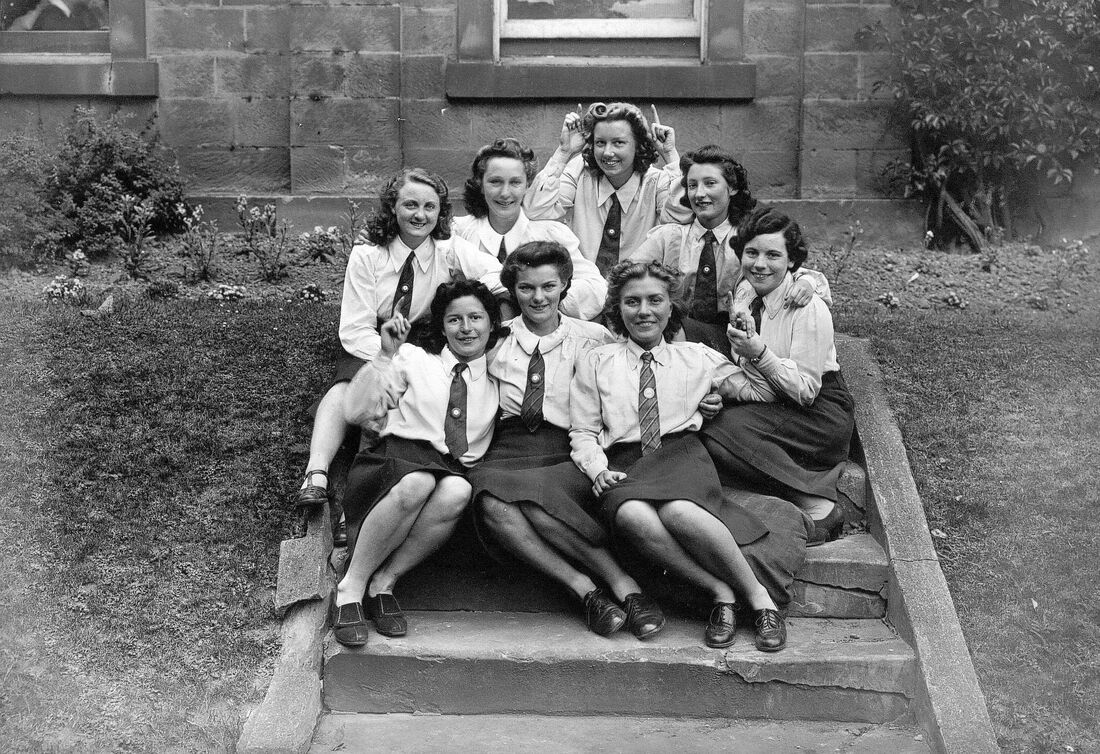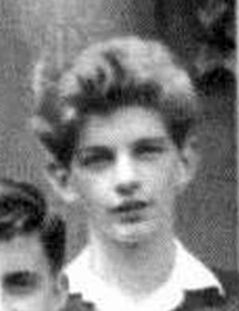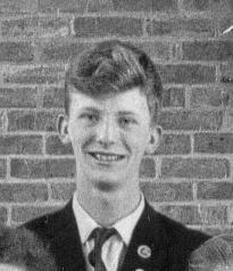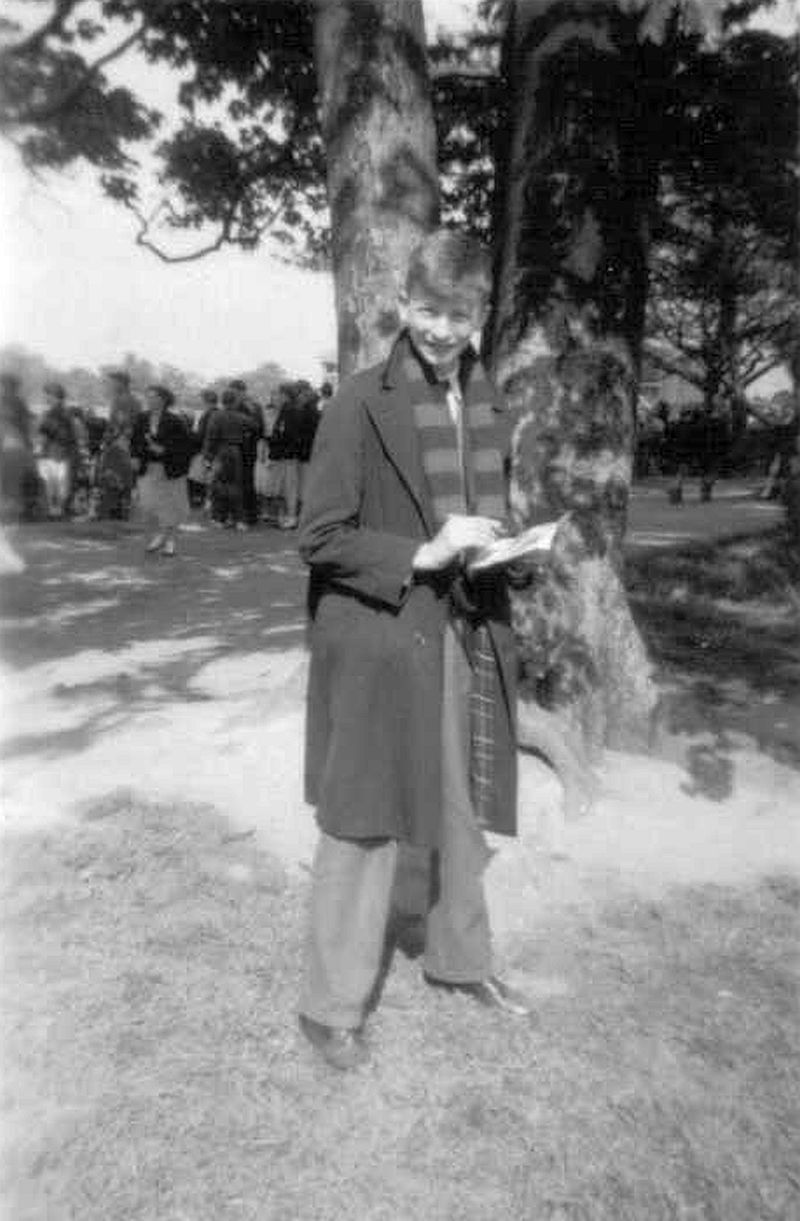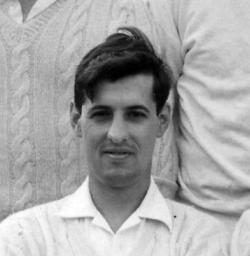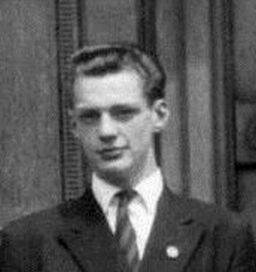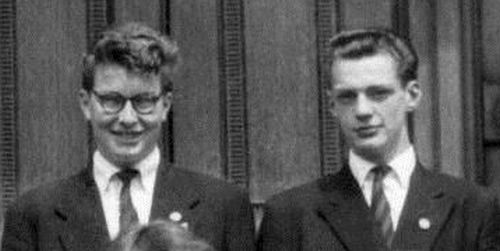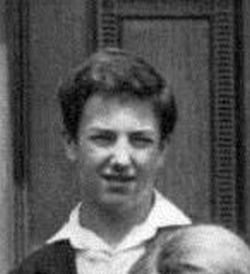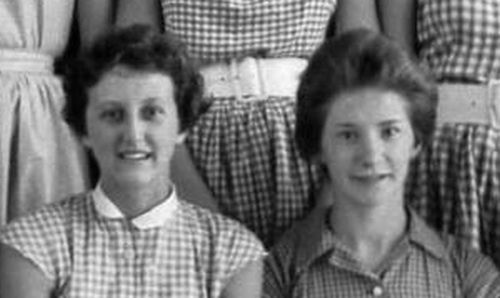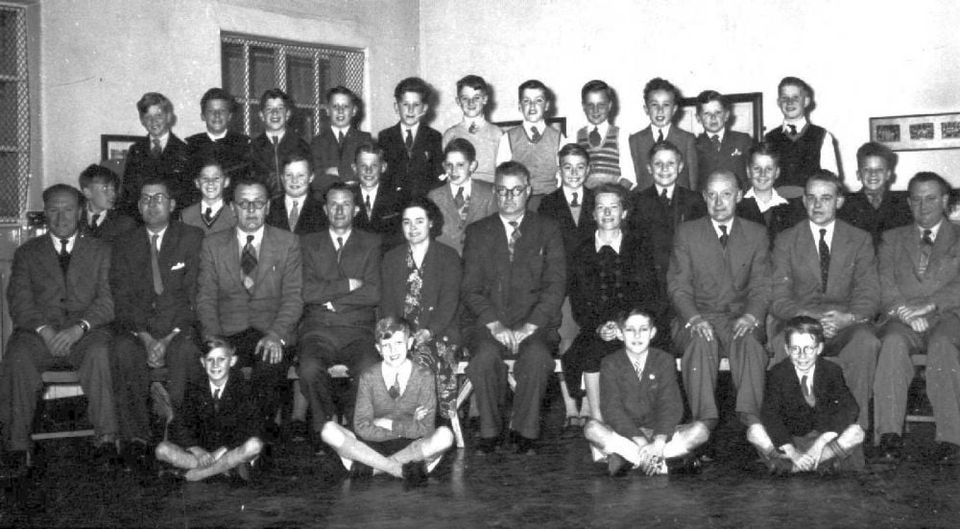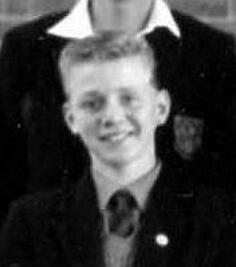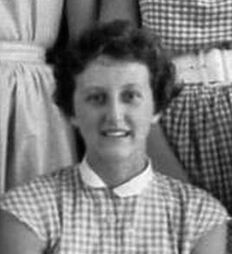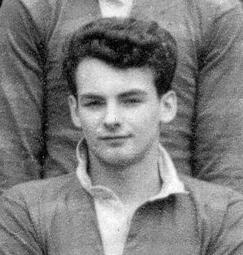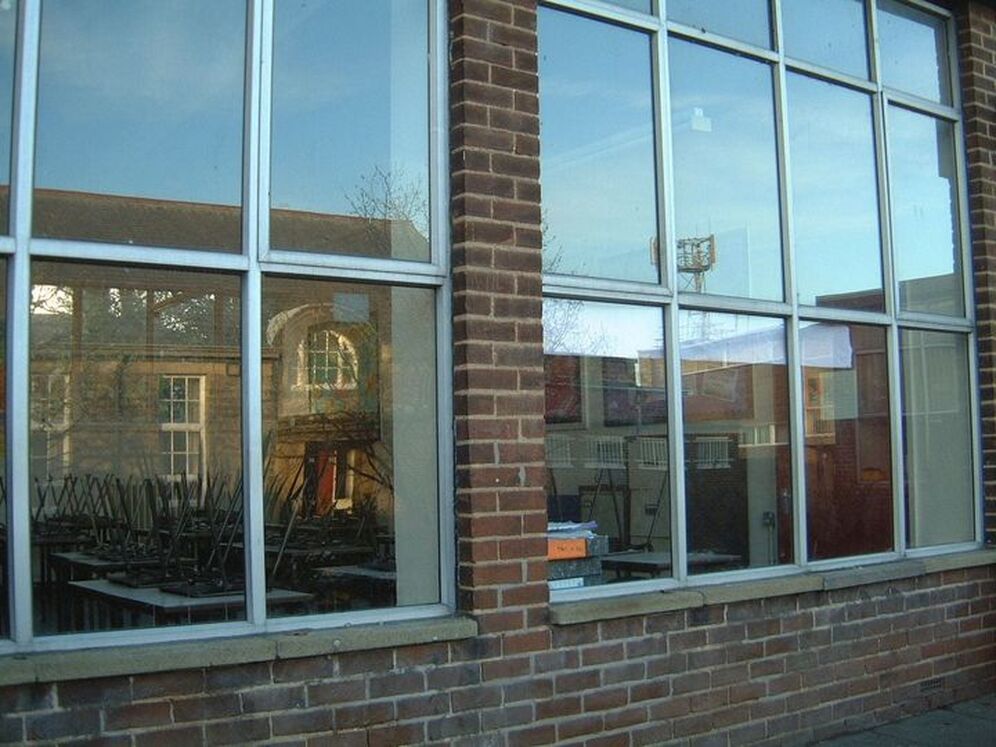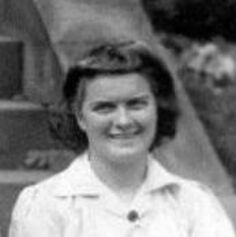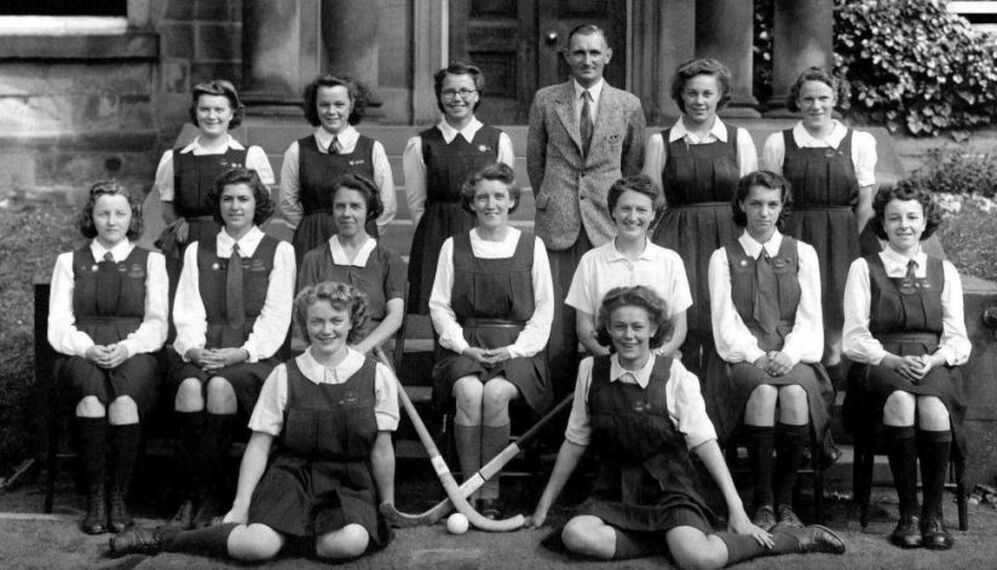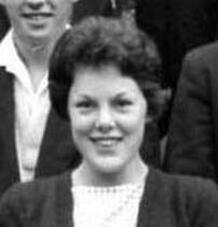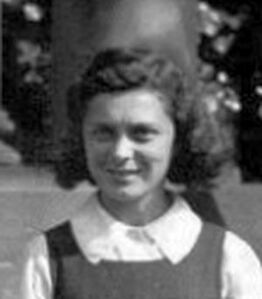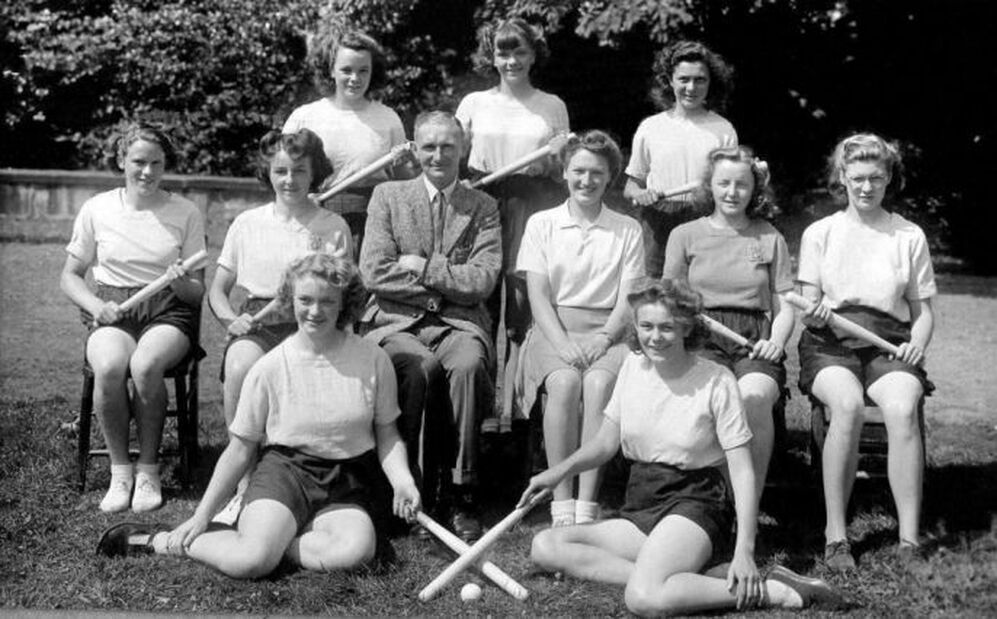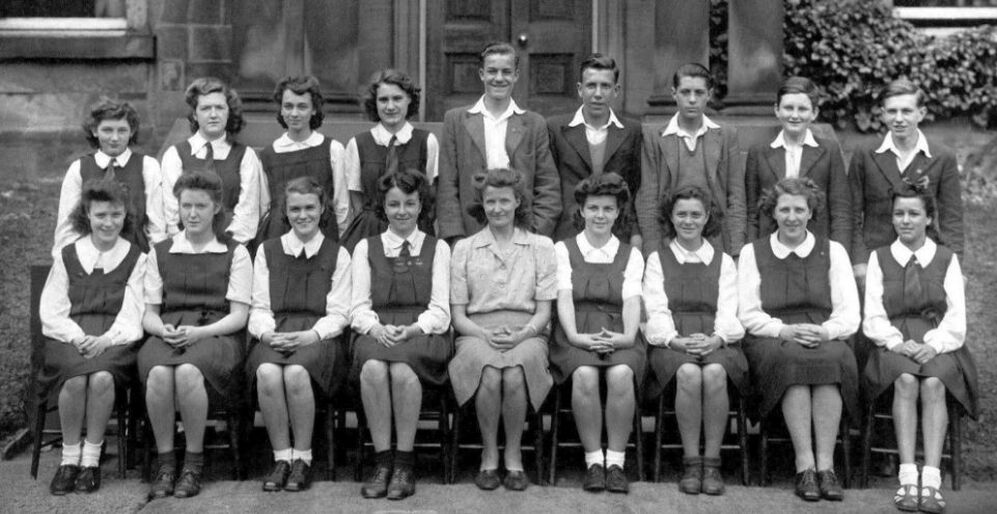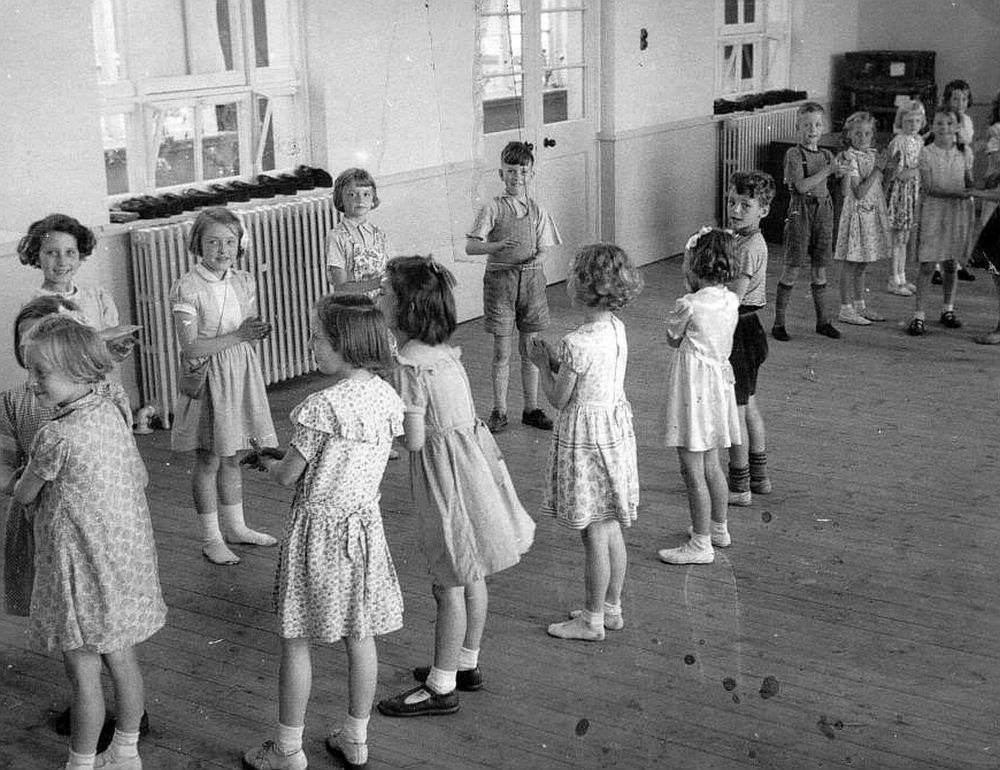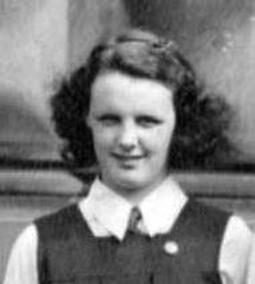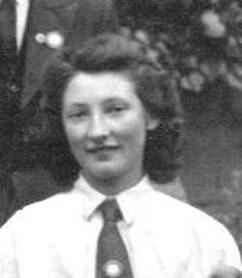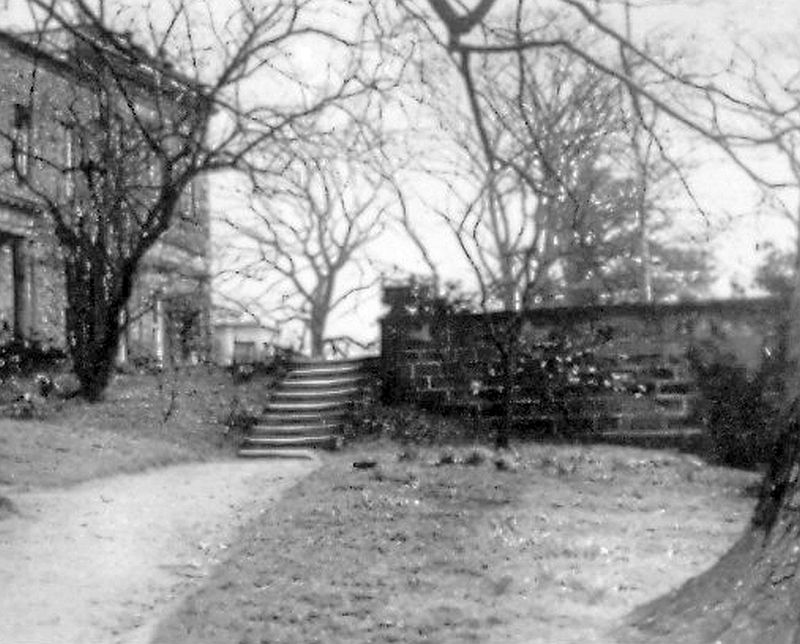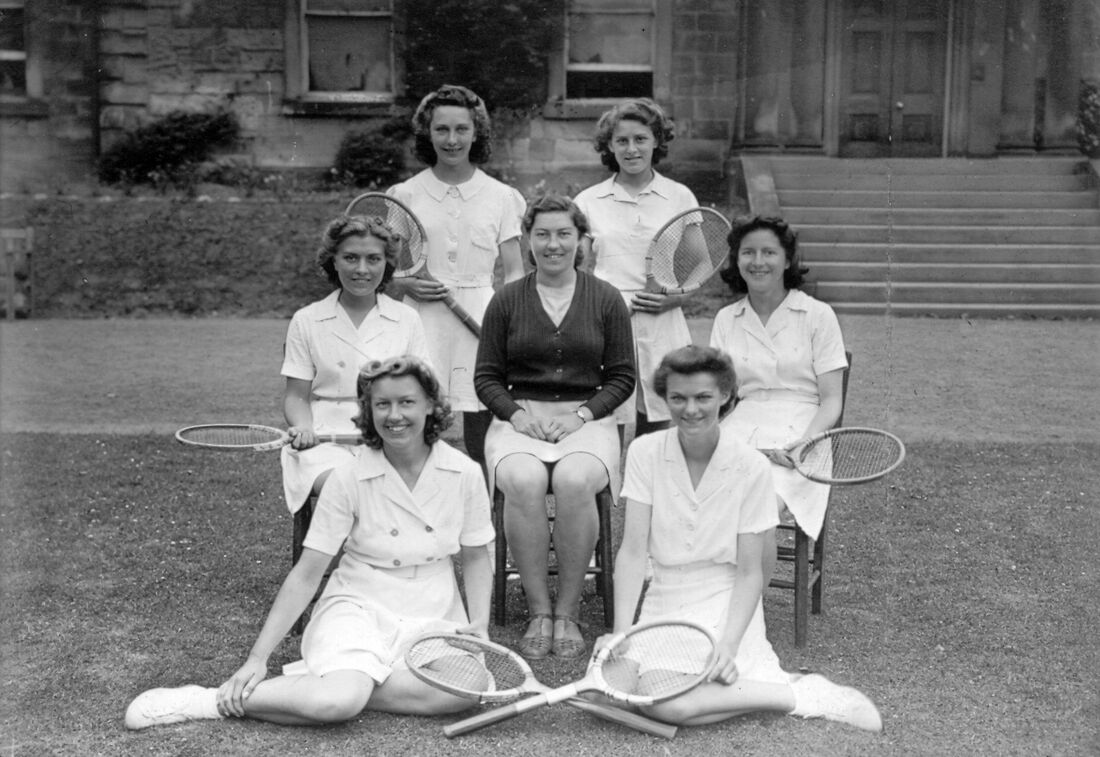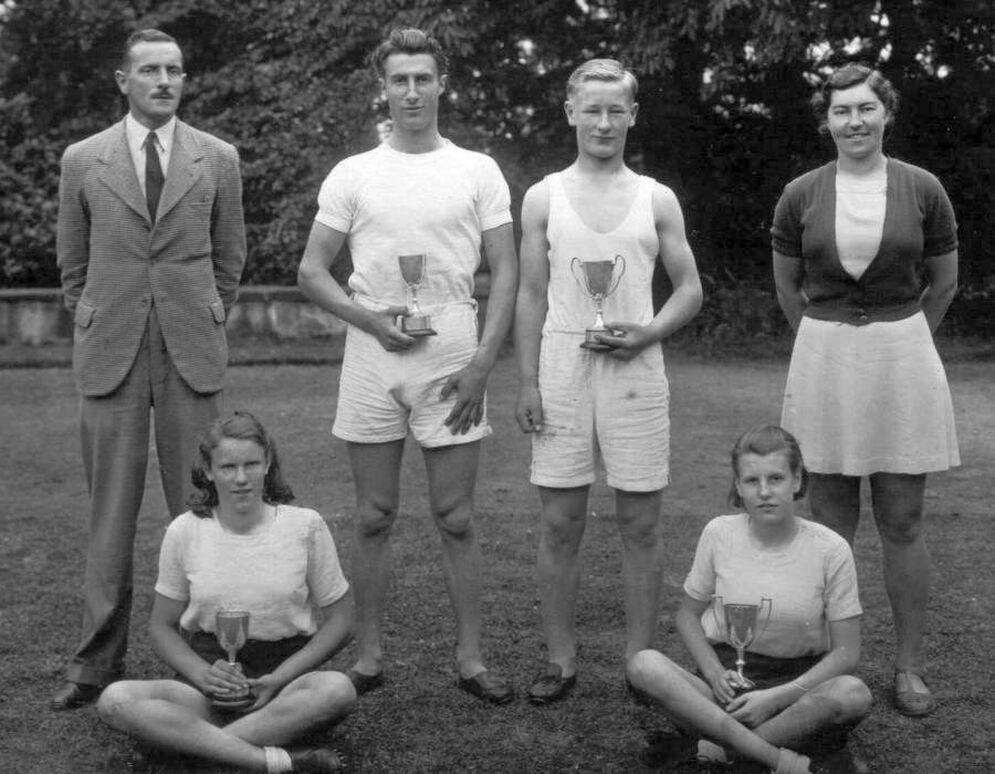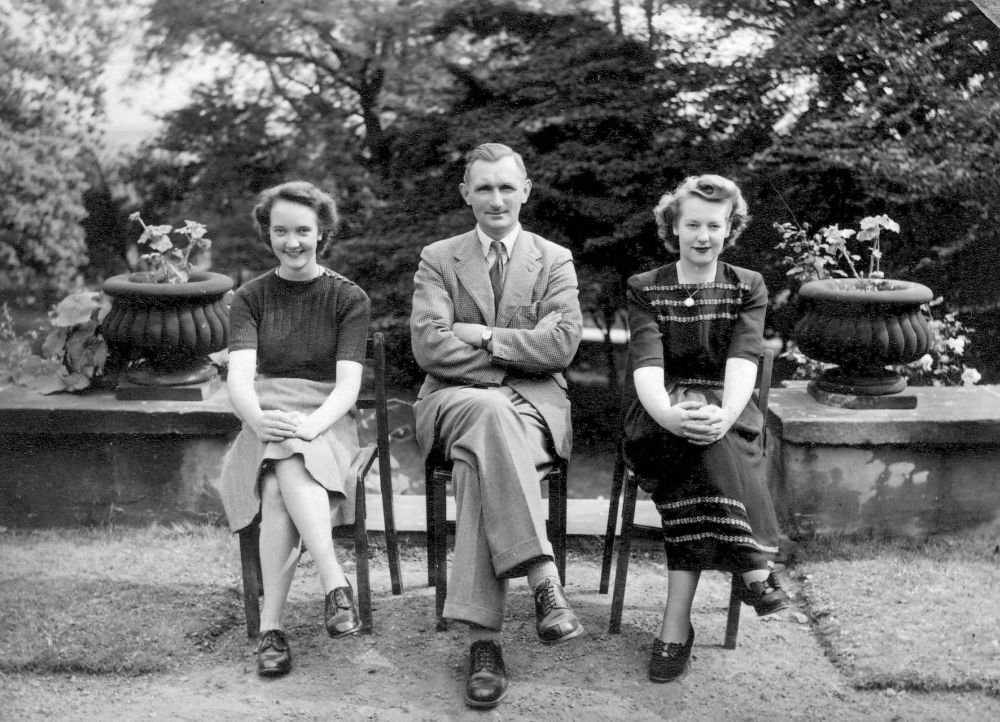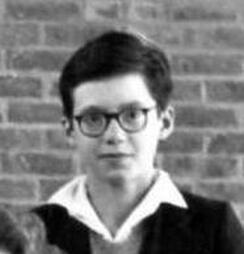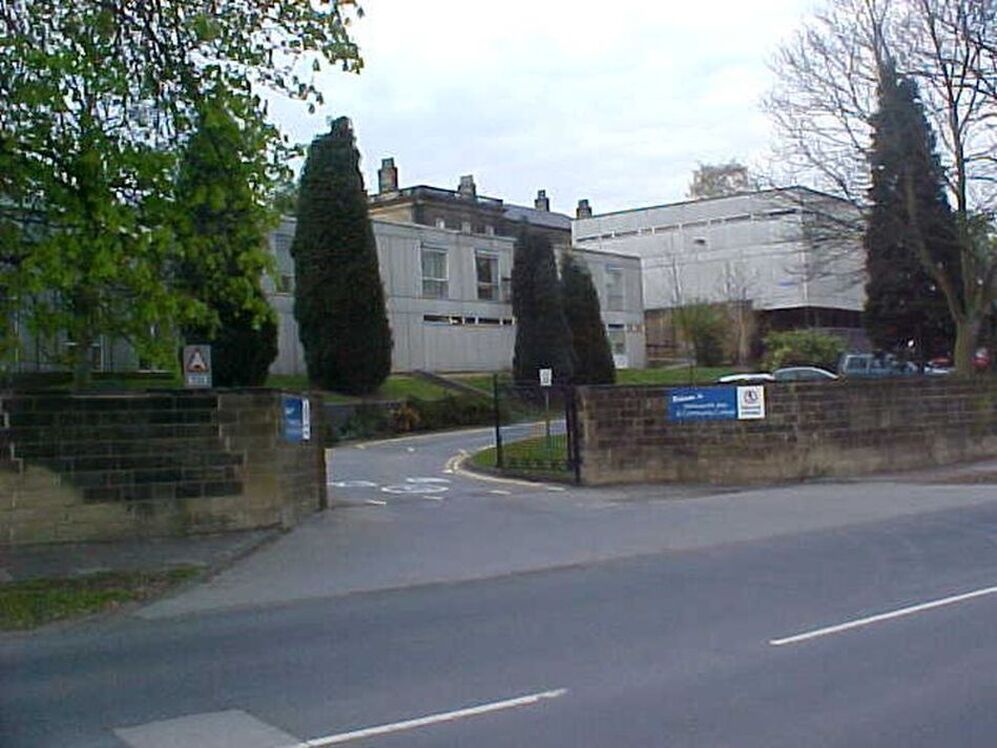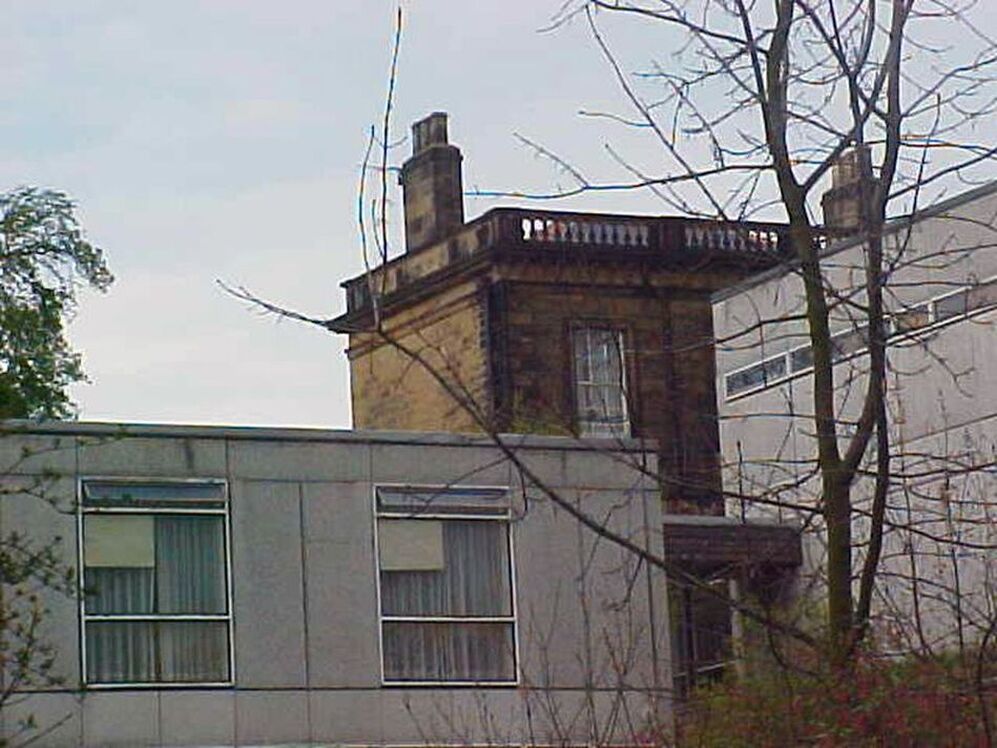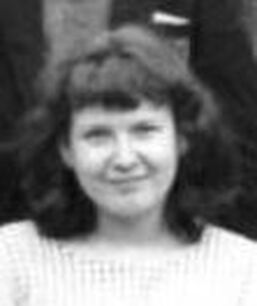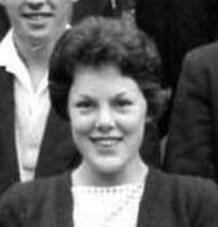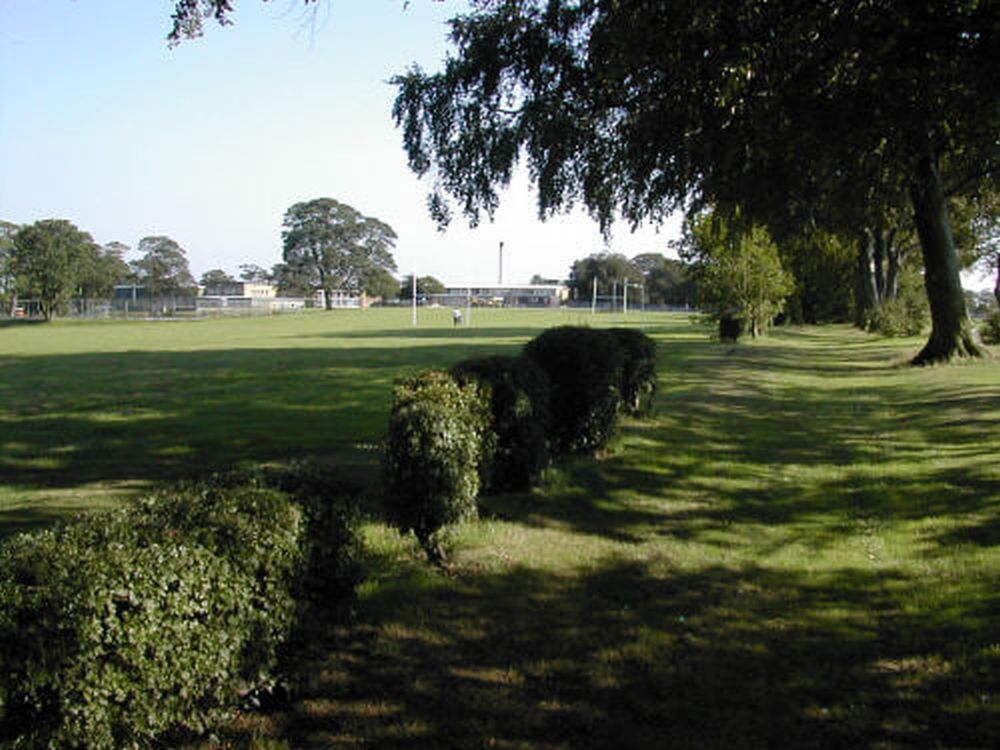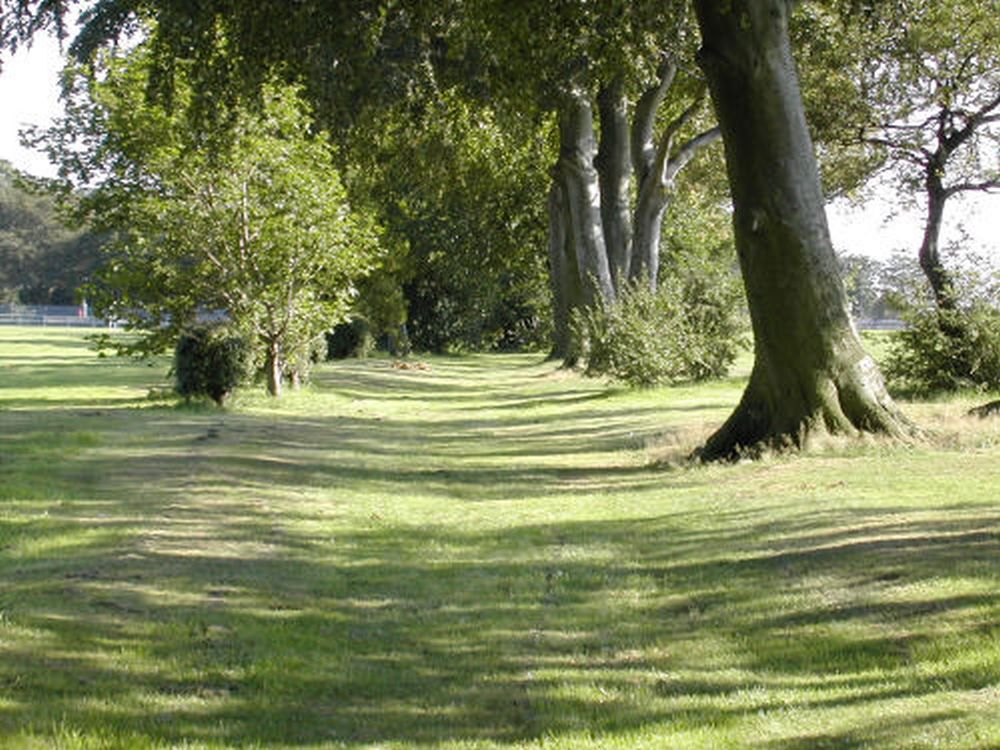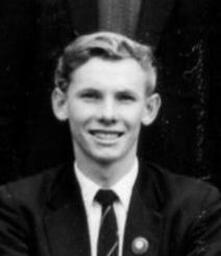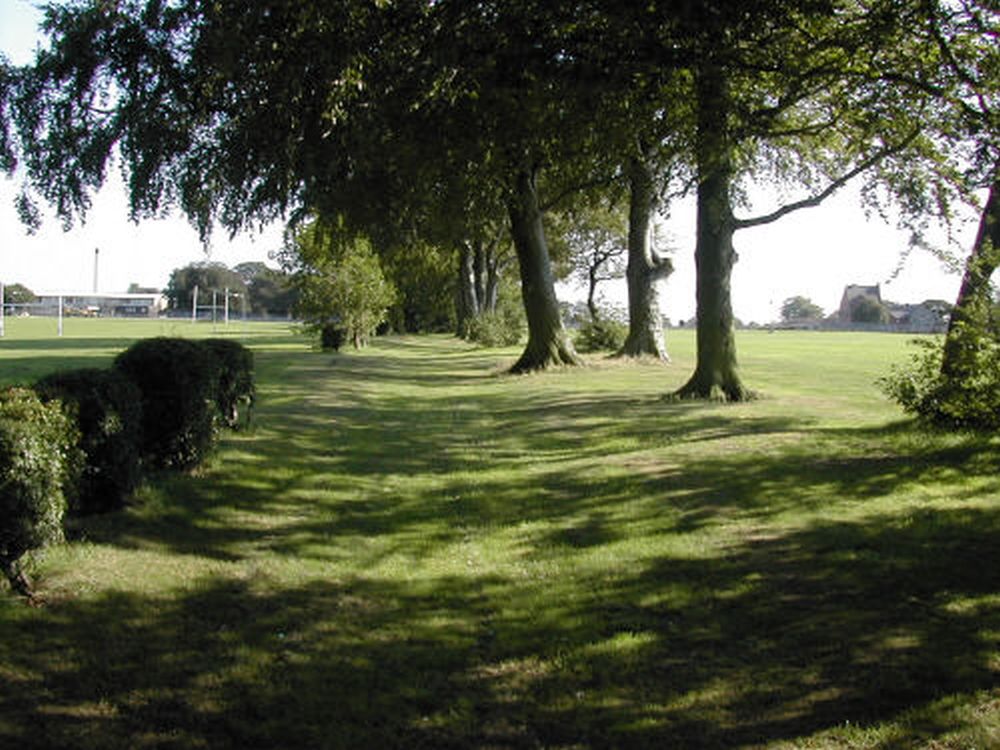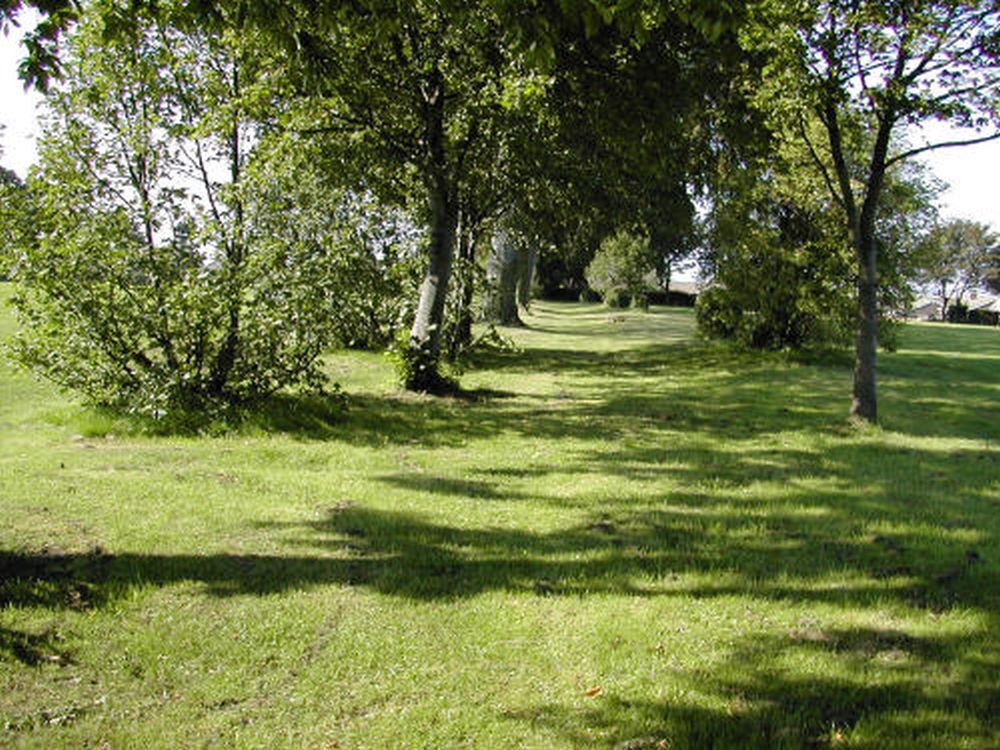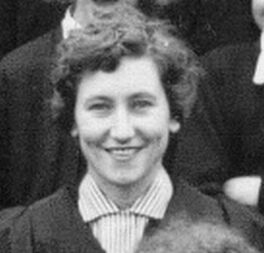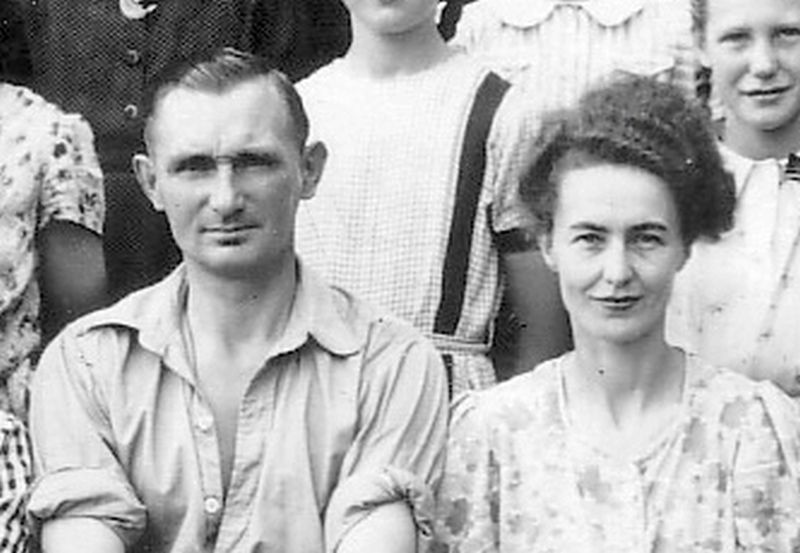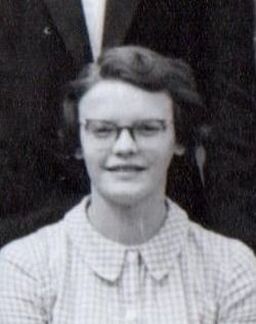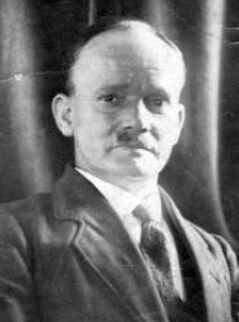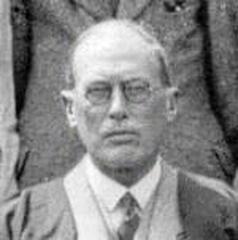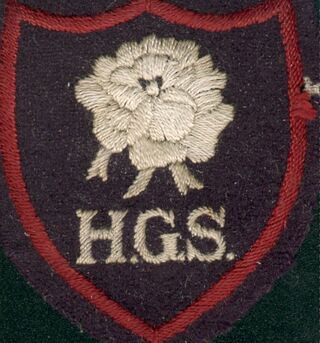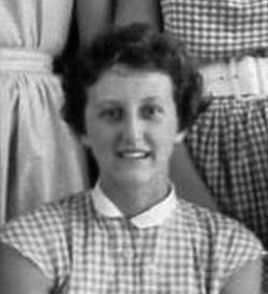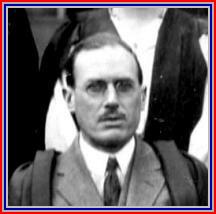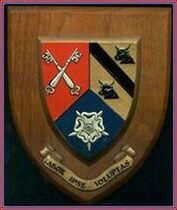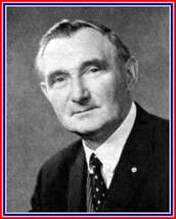A Personal View 7
Status: 10 items 11.05.2021
Status: 10 items 11.05.2021
"Memories came rushing back, as I read the letter, of the old school of which I was so proud. Pleasant memories which linger on through the years. Somehow, unpleasant ones, few though they be, disappear."
K. Flavell 1952
K. Flavell 1952
The HGS philosophy was to equip its pupils to get the most out of life when they left, and to give them a taste of things other than those at which they were naturally gifted. Those people we all met at HGS came into our lives for a reason, a season or a lifetime. Any way you look at it, attending HGS was a memorable time for everyone, and this site celebrates it.
Sheila Kelsall HGS 1955-62
Sheila Kelsall HGS 1955-62
The photo below was taken in 1943 and shows a happy group of friends - "Our Gang". The photo was taken just before the girls left HGS after 7 years. War was raging in Europe but at Hemsworth Grammar School life continued as normally as possible with all the obvious restrictions and limitations.
Back Row L-R: Margaret Townend, Valerie Davies, Jean Bailey, Mollie Weaver, Iris Holt.
Front Row L-R: Margaret Sunderland, Jean Burton, Marjorie Duckworth
This cheerful group would have been at HGS when it was led first by Mr Jenkinson and then Mr Hamilton. Jean Burton, from old Upton, sent a lot of information, articles and photographs, including this one, to the HGS site.
Front Row L-R: Margaret Sunderland, Jean Burton, Marjorie Duckworth
This cheerful group would have been at HGS when it was led first by Mr Jenkinson and then Mr Hamilton. Jean Burton, from old Upton, sent a lot of information, articles and photographs, including this one, to the HGS site.
Table of contents
|
1. Memories and feelings in the land where nothing changes.
2. Broad Lane Junior School Scholarship boys in 1955. 3. Our first year in 1955 in the New Block, Rooms 22 and 23. 4. School Fees and Exams 1940s at Hemsworth Grammar School. 5. A seldom seen view. |
6. The North Walk
7. The HGS Senior Mistresses 8. Hemsworth Secondary School Goes 'Grammar' 9. A Parent's Challenge in 1923 10. From the Forum: Thoughts and Hindsight |
1. Memories and Feelings in the land where nothing changes
A comment from Peter Miller HGS 1957-61
"It was great to find the link to the HGS web site from Friends United. Stepping back through your pages reminded me of numerous school chums, sadly no association continued after those school years."
I would think that this comment probably applies to many people who were possibly close friends at school but did not maintain that association after HGS. The reasons can be many, which we can all envisage. At least at school we were all part of reasonably cohesive units such as Year Groups, Houses, Forms, clubs or teams. Of necessity these HGS bonds had to be broken after school because we had to make our own way in the World.
"It was great to find the link to the HGS web site from Friends United. Stepping back through your pages reminded me of numerous school chums, sadly no association continued after those school years."
I would think that this comment probably applies to many people who were possibly close friends at school but did not maintain that association after HGS. The reasons can be many, which we can all envisage. At least at school we were all part of reasonably cohesive units such as Year Groups, Houses, Forms, clubs or teams. Of necessity these HGS bonds had to be broken after school because we had to make our own way in the World.
Here is a comment from Peter Kaye HGS 1955-62
"This vast new access to the past is an incredible experience. Having made contact with many ex-pupils from various stages of life, I think we are designed to 'grow old' slowly, readjusting to 'age' gradually and gently. Just quickly glancing at our reflection. This is all a bit of a sudden shock. What we were. Things that could have been. Opportunities taken and missed."
"This vast new access to the past is an incredible experience. Having made contact with many ex-pupils from various stages of life, I think we are designed to 'grow old' slowly, readjusting to 'age' gradually and gently. Just quickly glancing at our reflection. This is all a bit of a sudden shock. What we were. Things that could have been. Opportunities taken and missed."
Ken Sale HGS Staff 1955-61
Dear Sheila,
Hi.
Thank you for your last e-mail response, informing me of those who have achieved academic success over the past 50 years or so. It is humbling to realise that most of the ones who have succeeded at such high levels 'suffered' under my tutelage. I did always recognise that there were many who were infinitely cleverer than myself and so tried hard to stimulate, inspire and encourage their embryonic potential.
I trust that I did it with care, with respect and imagination. It makes me look back with considerable intent and earnestness. I have searched the dark recesses of the loft for past photos and have come up with four that show some familiar faces. I read the Forum through again as well as the games sections following the accounts of the Rugby, Cricket and Hockey sections with renewed interest. The school had an immense reputation, not only in South Yorkshire but also in the rest of the West Riding for the quality of its teams - all due to the superb organisation of the PE staff and their brilliant coaching skills. To defeat HGS at any game in those days was a major and worthy scalp. I remember bringing two teams from High Storrs (which at the time were probably the best teams in the area of Sheffield for their age groups) and suffering two considerable defeats by quicker, well-drilled, more skilful teams showing greater stamina than the boys at High Storrs. Our lads went back with a greater determination to become fitter and better. It was a salutary lesson that they were not as good as they thought, but they had enjoyed the experience.
A sad moment whilst I was at HGS is related to the fact that not enough of the fifth-formers went into higher education at A level. There was enormous potential talent that lay untapped especially in the Sciences, certainly in Biology. Another sad moment came during the last two weeks of my stay at HGS. I was swamped by the enormous generosity of the various groups with which I had been associated - Form, School, Staff, Biology groups, and rugby groups who all gave me and my fiancée gifts which we still treasure in some cases. I must say that it was slightly embarrassing but I did recognise that it was their way of saying thank you for being myself and supporting them in so many ways. I hope that I did not show the tears, but they were memorable moments, and their consideration and kindness have always remained in my memory at least. Perhaps I should have remained in touch, but life becomes very involved with new horizons and interests.
Continue with the good work, especially your memories of your return to school. They are fascinating.
Yours,
Ken Sale
(October 2004)
Dear Ken,
How wonderfully generous you are to share your recollections with us! You certainly have a gift for portraying the picture of those happy times. They exist in a land where nothing changes, and the wider the picture, the more the pleasure. I only hope you are receiving an equivalent enjoyment as you browse the site. So many people are joining in, and bit by bit we are all filling in our little pieces of information. One would think that eventually we would all know everything - but not so! During the two years or so of the site's existence we have discovered many layers of rich memories from within School and in the wider community. It has taken time and dedication to tease out those memories from underneath 30, 40, 60, and even 70 years of subsequent life experiences, but we feel it's a job worth doing, and it's a race against time. After a slow and hesitant beginning, we have been constantly gratified by the enthusiasm of everyone we encounter to help us lay down a true record of those exceptional few years when we were all lucky enough to find so many opportunities to grasp.
Sincerely,
Sheila
Dear Sheila,
Hi.
Thank you for your last e-mail response, informing me of those who have achieved academic success over the past 50 years or so. It is humbling to realise that most of the ones who have succeeded at such high levels 'suffered' under my tutelage. I did always recognise that there were many who were infinitely cleverer than myself and so tried hard to stimulate, inspire and encourage their embryonic potential.
I trust that I did it with care, with respect and imagination. It makes me look back with considerable intent and earnestness. I have searched the dark recesses of the loft for past photos and have come up with four that show some familiar faces. I read the Forum through again as well as the games sections following the accounts of the Rugby, Cricket and Hockey sections with renewed interest. The school had an immense reputation, not only in South Yorkshire but also in the rest of the West Riding for the quality of its teams - all due to the superb organisation of the PE staff and their brilliant coaching skills. To defeat HGS at any game in those days was a major and worthy scalp. I remember bringing two teams from High Storrs (which at the time were probably the best teams in the area of Sheffield for their age groups) and suffering two considerable defeats by quicker, well-drilled, more skilful teams showing greater stamina than the boys at High Storrs. Our lads went back with a greater determination to become fitter and better. It was a salutary lesson that they were not as good as they thought, but they had enjoyed the experience.
A sad moment whilst I was at HGS is related to the fact that not enough of the fifth-formers went into higher education at A level. There was enormous potential talent that lay untapped especially in the Sciences, certainly in Biology. Another sad moment came during the last two weeks of my stay at HGS. I was swamped by the enormous generosity of the various groups with which I had been associated - Form, School, Staff, Biology groups, and rugby groups who all gave me and my fiancée gifts which we still treasure in some cases. I must say that it was slightly embarrassing but I did recognise that it was their way of saying thank you for being myself and supporting them in so many ways. I hope that I did not show the tears, but they were memorable moments, and their consideration and kindness have always remained in my memory at least. Perhaps I should have remained in touch, but life becomes very involved with new horizons and interests.
Continue with the good work, especially your memories of your return to school. They are fascinating.
Yours,
Ken Sale
(October 2004)
Dear Ken,
How wonderfully generous you are to share your recollections with us! You certainly have a gift for portraying the picture of those happy times. They exist in a land where nothing changes, and the wider the picture, the more the pleasure. I only hope you are receiving an equivalent enjoyment as you browse the site. So many people are joining in, and bit by bit we are all filling in our little pieces of information. One would think that eventually we would all know everything - but not so! During the two years or so of the site's existence we have discovered many layers of rich memories from within School and in the wider community. It has taken time and dedication to tease out those memories from underneath 30, 40, 60, and even 70 years of subsequent life experiences, but we feel it's a job worth doing, and it's a race against time. After a slow and hesitant beginning, we have been constantly gratified by the enthusiasm of everyone we encounter to help us lay down a true record of those exceptional few years when we were all lucky enough to find so many opportunities to grasp.
Sincerely,
Sheila
John Harrow
A short email conversation
Hello Sheila,
The amazing website evoked memories of long summer lunchtime breaks on the playing fields when nobody bothered to ring the bell! You will not remember me. I knocked around with John Sumnall and Denis Burton. You were in a trio with Pat Stollard and another. I was there 1957-62. In 1961, I bought flowers from your stall in South Elmsall market each Saturday. There are not many people from my year registered on the site. Of the others, so many became teachers.
Yours sincerely,
John Harrow
(February 2004)
Hello Sheila,
The amazing website evoked memories of long summer lunchtime breaks on the playing fields when nobody bothered to ring the bell! You will not remember me. I knocked around with John Sumnall and Denis Burton. You were in a trio with Pat Stollard and another. I was there 1957-62. In 1961, I bought flowers from your stall in South Elmsall market each Saturday. There are not many people from my year registered on the site. Of the others, so many became teachers.
Yours sincerely,
John Harrow
(February 2004)
Denis Burton (left) and John Harrow
John Sumnall
Sheila Kelsall (left) and Pat Stollard
Dear John,
Of course I remember you! Funnily enough, you are on my 'to do' list. My role within the set-up of the website is to do the contacting and correspondence wherever possible, and I have already been in touch with John Sumnall. You were to be invited to visit Willowhemhistory very soon - and so you have beaten me to it! Please tell me, how did you learn of the site? I know that some Hilmians have just typed Hems. Gram. Sch. into a search engine (Google, AltaVista etc.) and found us, and others have learned of us by word of mouth. Anyway, it's lovely to hear from you. All in all, it's very flattering that we seem to awaken good memories of happy times, and people tell us so. They were such happy days, weren't they!
Fancy you remembering that stall on Elmsall market! Directly across from there was another fruit & veg. stall where Pete Dickens, Kathleen Frost and Marcia Bradley - all HGS - worked. At the end of each Saturday, unwilling to take the stocks of ripe bananas back to the shop, first one side would reduce the price by a penny "one and six a pound bananas" would be shouted, and then the others would shout "one and five a pound...." and so it went on, until we were down to threepence a pound! Great fun. I'm really touched that you have held kind thoughts of me for forty-odd years.
You will certainly be able to fill the hours by exploring the site, and I would ask you especially to have a look at your class photos there and try to supply us with any names we have missed. Also on the panoramas there are many gaps. What was your pathway through School? 1A, 2B....etc. Which House did you belong to? Do you have any photos from that time which could augment the records? You must be very busy, I know, but we would be delighted to receive anything you can dig out of your attic/cellar/bottom drawers.
Looking forward to hearing from you again,
Sincerely,
Sheila.
Dear Sheila,
Thank you for replying so fully and promptly. What memories! I suppose we have reached the age when we look back rather than forward. I was in 1, 2, 3, 4, 5A and my house was Price. I found the HGS website from your entry on Friends Reunited several months ago. I wonder why so few of my contemporaries have responded to the website?
It would be interesting to know what became of our teachers. We led some of them a merry dance. Mr. Lock and his bubble car; Mr. Swinbank with his lisp; Mr. Hudson and his youth hostelling; Ken Sale; George Pacy; Mr. Boyd trying to teach music against all odds. Mr. Hodgson the geography teacher and Jock Kennedy's Scots/English.
All my friends liked you because it was rare for someone from an older year to talk to you unless it was as a Prefect handing out punishment. One used to make us stand in the quad next to and in the same pose as the statue, or pick daisies there and make a daisy chain. You were a nice person and I recall quite a good athlete. I suppose one of the attractions of school day nostalgia is that we were all innocents (though we thought otherwise) and had no idea what our lives had in store for us.
Sincerely,
John
Of course I remember you! Funnily enough, you are on my 'to do' list. My role within the set-up of the website is to do the contacting and correspondence wherever possible, and I have already been in touch with John Sumnall. You were to be invited to visit Willowhemhistory very soon - and so you have beaten me to it! Please tell me, how did you learn of the site? I know that some Hilmians have just typed Hems. Gram. Sch. into a search engine (Google, AltaVista etc.) and found us, and others have learned of us by word of mouth. Anyway, it's lovely to hear from you. All in all, it's very flattering that we seem to awaken good memories of happy times, and people tell us so. They were such happy days, weren't they!
Fancy you remembering that stall on Elmsall market! Directly across from there was another fruit & veg. stall where Pete Dickens, Kathleen Frost and Marcia Bradley - all HGS - worked. At the end of each Saturday, unwilling to take the stocks of ripe bananas back to the shop, first one side would reduce the price by a penny "one and six a pound bananas" would be shouted, and then the others would shout "one and five a pound...." and so it went on, until we were down to threepence a pound! Great fun. I'm really touched that you have held kind thoughts of me for forty-odd years.
You will certainly be able to fill the hours by exploring the site, and I would ask you especially to have a look at your class photos there and try to supply us with any names we have missed. Also on the panoramas there are many gaps. What was your pathway through School? 1A, 2B....etc. Which House did you belong to? Do you have any photos from that time which could augment the records? You must be very busy, I know, but we would be delighted to receive anything you can dig out of your attic/cellar/bottom drawers.
Looking forward to hearing from you again,
Sincerely,
Sheila.
Dear Sheila,
Thank you for replying so fully and promptly. What memories! I suppose we have reached the age when we look back rather than forward. I was in 1, 2, 3, 4, 5A and my house was Price. I found the HGS website from your entry on Friends Reunited several months ago. I wonder why so few of my contemporaries have responded to the website?
It would be interesting to know what became of our teachers. We led some of them a merry dance. Mr. Lock and his bubble car; Mr. Swinbank with his lisp; Mr. Hudson and his youth hostelling; Ken Sale; George Pacy; Mr. Boyd trying to teach music against all odds. Mr. Hodgson the geography teacher and Jock Kennedy's Scots/English.
All my friends liked you because it was rare for someone from an older year to talk to you unless it was as a Prefect handing out punishment. One used to make us stand in the quad next to and in the same pose as the statue, or pick daisies there and make a daisy chain. You were a nice person and I recall quite a good athlete. I suppose one of the attractions of school day nostalgia is that we were all innocents (though we thought otherwise) and had no idea what our lives had in store for us.
Sincerely,
John
2. Broad Lane Junior School Scholarship boys in 1955.
A test of recognition and memory.
These pupils were attending Broad Lane Juniors in 1955. They passed their 11+ and many went to HGS. This was my year so I know quite a lot of them but not all. I do not know any of the staff. That's your challenge, pupils and staff. One of these pupils (G.W.) was possibly the cleverest pupil in my year. Any ideas?
The names come from Keith Twigg. Thank you, Keith.
Back Row L-R: Keith Twigg, Lewis Taylor, Greg Whitehurst, Neil Whalley, Godfrey Wass, Sam Lewis, Colin Bond, Norman Valentine, David Greasley, Geoff Abell, Alan Tildesley
Third Row L-R: Les Winterburn, Robert Taylor, Godfrey Evans, Peter Foster, 5, Chris Kenningley, Gordon Bond, Denis Matthews, Martin Rhodes
Second Row L-R: 1, 2, 3, Mr Brownridge, 5, Mr Foster (Headmaster), 7, 8, 9, Mr Howgate
Front Row L-R: Michael Duke, Brian Lees, 3, Bernard Grundy
These pupils were attending Broad Lane Juniors in 1955. They passed their 11+ and many went to HGS. This was my year so I know quite a lot of them but not all. I do not know any of the staff. That's your challenge, pupils and staff. One of these pupils (G.W.) was possibly the cleverest pupil in my year. Any ideas?
The names come from Keith Twigg. Thank you, Keith.
Back Row L-R: Keith Twigg, Lewis Taylor, Greg Whitehurst, Neil Whalley, Godfrey Wass, Sam Lewis, Colin Bond, Norman Valentine, David Greasley, Geoff Abell, Alan Tildesley
Third Row L-R: Les Winterburn, Robert Taylor, Godfrey Evans, Peter Foster, 5, Chris Kenningley, Gordon Bond, Denis Matthews, Martin Rhodes
Second Row L-R: 1, 2, 3, Mr Brownridge, 5, Mr Foster (Headmaster), 7, 8, 9, Mr Howgate
Front Row L-R: Michael Duke, Brian Lees, 3, Bernard Grundy
Keith Twigg
3. That first year of ours in 1955 based in the New Block, Rooms 22 and 23.
Sheila Kelsall
Dear Dave,
You ask for memories of that first year of ours in 1955. I have remembered most of the teachers who started me on the journey through School. In 1B, Miss Hampshire was our Form teacher, and she taught us French also. We sang 'Frère Jacques', and the carol, 'Il est né, le divin enfant.' (English: He is born, the divine Child). We even tackled the French National Anthem! Monsieur et Madame Mercier and children were our typical French text-book family. Miss Ward spent a lot of time with us, as she covered English, Geography and History. Mr. Collins took Geometry and Arithmetic, leaving Algebra to be embarked upon later in the year, I think. Mrs Blatherwick (who was previously Miss Parkin) did the PT lessons in the Assembly Hall as well as out on the playing fields. I used to love those indoor lessons, when she would have all the apparatus out. The ropes were pulled across the middle of the room like a curtain splitting the area in two, and the wall bars and beams were swung into position and bolted firmly into the parquet floor, giving the opportunity for climbing and balancing. Crash mats were arranged in groups together with benches. (Were these kept underneath the stage?) We used to play a game called "Pirates", where one or two 'catchers' would pursue the rest of the class across the apparatus. The idea was that one should not touch the floor at any time as this was imagined to be "the sea". To travel from one piece to another, wooden hoops were designated 'safe stepping stones'. When anyone was caught by being touched by the catchers, they dropped out of the game, and the winner was the last person still free. I sometimes won this game, which is probably why I remember it! Nothing sticks better in the mind than success.
There was a distinct "smell" which pervaded our year in the "New Block". Not an unpleasant one, but quite memorable. It was like silicone desk-polish crossed with orange ice-lollies, and the smell of new leather satchels. All our clothes were also new, and I remember my mother buying 3 yards of blue quarter-inch gingham, 36" wide, from the School-outfitter shop down in the village (what was their name?). This then had to be taken to a local dressmaker so that I could present myself in the correct dress of the Summer Uniform at the beginning of the Spring Term. Gymslips, shirts and ties out, dresses in! This was when we girls could abandon our suspender belts and lisle stockings for the freedom of short white socks. We also changed our outer-wear from the navy gabardine mac to a blazer with a School badge on the top left-hand pocket - also purchased from the gingham shop. Hats were compulsory with both summer and winter uniforms.
The manners of those times dictated that we should stand when a member of Staff entered the room - a noisy routine, sometimes. We always added the word "Sir" when replying to a male member of Staff, and used the female teacher's full name likewise. This applied to all ages in the School. We had our own cloakrooms and toilets in the New Block, and the fact that we could "go for a walk" at playtime meant that we tended not to mix with older boys and girls until the second year, when we were based in the Main Building,-- and that's another story!
Sheila Kelsall, HGS 1955-62
Dear Sheila,
I read your reminisce under the heading of "New Block" memories. Just to remind you that the school outfitter in Hemsworth was Jackson's.
Geoff Govier
You ask for memories of that first year of ours in 1955. I have remembered most of the teachers who started me on the journey through School. In 1B, Miss Hampshire was our Form teacher, and she taught us French also. We sang 'Frère Jacques', and the carol, 'Il est né, le divin enfant.' (English: He is born, the divine Child). We even tackled the French National Anthem! Monsieur et Madame Mercier and children were our typical French text-book family. Miss Ward spent a lot of time with us, as she covered English, Geography and History. Mr. Collins took Geometry and Arithmetic, leaving Algebra to be embarked upon later in the year, I think. Mrs Blatherwick (who was previously Miss Parkin) did the PT lessons in the Assembly Hall as well as out on the playing fields. I used to love those indoor lessons, when she would have all the apparatus out. The ropes were pulled across the middle of the room like a curtain splitting the area in two, and the wall bars and beams were swung into position and bolted firmly into the parquet floor, giving the opportunity for climbing and balancing. Crash mats were arranged in groups together with benches. (Were these kept underneath the stage?) We used to play a game called "Pirates", where one or two 'catchers' would pursue the rest of the class across the apparatus. The idea was that one should not touch the floor at any time as this was imagined to be "the sea". To travel from one piece to another, wooden hoops were designated 'safe stepping stones'. When anyone was caught by being touched by the catchers, they dropped out of the game, and the winner was the last person still free. I sometimes won this game, which is probably why I remember it! Nothing sticks better in the mind than success.
There was a distinct "smell" which pervaded our year in the "New Block". Not an unpleasant one, but quite memorable. It was like silicone desk-polish crossed with orange ice-lollies, and the smell of new leather satchels. All our clothes were also new, and I remember my mother buying 3 yards of blue quarter-inch gingham, 36" wide, from the School-outfitter shop down in the village (what was their name?). This then had to be taken to a local dressmaker so that I could present myself in the correct dress of the Summer Uniform at the beginning of the Spring Term. Gymslips, shirts and ties out, dresses in! This was when we girls could abandon our suspender belts and lisle stockings for the freedom of short white socks. We also changed our outer-wear from the navy gabardine mac to a blazer with a School badge on the top left-hand pocket - also purchased from the gingham shop. Hats were compulsory with both summer and winter uniforms.
The manners of those times dictated that we should stand when a member of Staff entered the room - a noisy routine, sometimes. We always added the word "Sir" when replying to a male member of Staff, and used the female teacher's full name likewise. This applied to all ages in the School. We had our own cloakrooms and toilets in the New Block, and the fact that we could "go for a walk" at playtime meant that we tended not to mix with older boys and girls until the second year, when we were based in the Main Building,-- and that's another story!
Sheila Kelsall, HGS 1955-62
Dear Sheila,
I read your reminisce under the heading of "New Block" memories. Just to remind you that the school outfitter in Hemsworth was Jackson's.
Geoff Govier
Dave McKenzie
Room 22 in the New Block in 2003
There are chairs on the desks at the end of the day to help the cleaning ladies in their very valuable work. The windows look clean. "Nice to see". Unusual to see the Dell trees, the Dining Room and the Science Block on the same photo.
There are chairs on the desks at the end of the day to help the cleaning ladies in their very valuable work. The windows look clean. "Nice to see". Unusual to see the Dell trees, the Dining Room and the Science Block on the same photo.
Our dark-coloured wooden desks in 1C 1955-56 were rather different to those shown here. They sloped towards you and had a lift up lid. The legs were iron I think. There was also an ink well on the top right of the desk. We used scratchy dip-in pens that had a round, wooden handle and a removable nib. I think many used fountain pens. Someone was designated the ink monitor who came round and filled up the ink wells from a big ink bottle with a hook-shaped pourer. It was an important job. Ball-point pens took over as time went on. Mr Leonard was not happy about that. When I went to school in Skellow as a four year old we were given slates and chalk to make our marks.
When I first went into HGS 1C in September 1955, I had an empty satchel, an empty desk and an empty head. I only knew Audrey Lynch from my Junior School in Upton. The desk position, one back from the front, was where I sat in room 23. This room was at the other side of the the ice cream shop. I was not happy at all after the lovely Harewood Lane Junior School. Mrs M. Marsden was one of my Form Teachers there. She went to Hemsworth Grammar school (Mary Halsall) in the 1940s. Lovely teacher. I was sad to leave that school. There was also a Miss Pinkney that taught me there (First Form Juniors). I wonder if she went to HGS. There is certainly a girl on record of about the right age called Joan Pinkney (see below). Mr Simmons taught the Second Year and Mr Green the Fourth Year before we went to Secondary School.
When I first went into HGS 1C in September 1955, I had an empty satchel, an empty desk and an empty head. I only knew Audrey Lynch from my Junior School in Upton. The desk position, one back from the front, was where I sat in room 23. This room was at the other side of the the ice cream shop. I was not happy at all after the lovely Harewood Lane Junior School. Mrs M. Marsden was one of my Form Teachers there. She went to Hemsworth Grammar school (Mary Halsall) in the 1940s. Lovely teacher. I was sad to leave that school. There was also a Miss Pinkney that taught me there (First Form Juniors). I wonder if she went to HGS. There is certainly a girl on record of about the right age called Joan Pinkney (see below). Mr Simmons taught the Second Year and Mr Green the Fourth Year before we went to Secondary School.
Mrs Marsden was our Third Year Form Teacher at Upton Harewood Lane Juniors. To me she was in the same league as Miss Collins, my 1C Form and English teacher at HGS.
This photograph was taken on photographs day 1945 at HGS (Lower 6th).
This photograph was taken on photographs day 1945 at HGS (Lower 6th).
First Team Hockey 1944-45
A lovely photo with Mrs Hamilton taking full part.
A lovely photo with Mrs Hamilton taking full part.
Back Row L-R: Mary Halsall, Georgina Smart, Olive Mellor, Mr Hamilton, Betty Robinson, Mary Griffiths.
Middle Row L-R: Brenda Swinbank, Frances Hemingway, Miss Shortridge, Mrs Hamilton, Miss Dunbar, Joyce Burton, Bessie Findler.
Front Row L-R: Veronica Bates, Jean Gough
Middle Row L-R: Brenda Swinbank, Frances Hemingway, Miss Shortridge, Mrs Hamilton, Miss Dunbar, Joyce Burton, Bessie Findler.
Front Row L-R: Veronica Bates, Jean Gough
Daphne Hart
I also remember Mrs. Marsden from my relatively short time at Harewood Lane School. Many years later I saw her in the Sacred Heart Church in Hemsworth when we were attending Mass. I knew her as soon as I saw her, and much to my delight she recognised me. Her daughter went to HGS and was in the same class as my sister.
Joan Pinkney
Rounders First Team 1944-45
Back Row L-R: Georgina Smart, Betty Davison, Joan Pinkney
Middle Row L-R: Mary Griffiths, Bessie Findler, Mr Hamilton, Miss J. Dunbar, Brenda Swinbank, Marian Lakin
Front Row L-R: Veronica Bates, Jean Gough.
Middle Row L-R: Mary Griffiths, Bessie Findler, Mr Hamilton, Miss J. Dunbar, Brenda Swinbank, Marian Lakin
Front Row L-R: Veronica Bates, Jean Gough.
5A 1944-45
Back Row L-R: Margaret Wilcock, Pauline Riggott, Winifred Griffiths, Derek Birkin, Ralph Miles, Leonard Parkin, Hudson, John Butt.
Front Row L-R: Ivy Simpson, Miriam Jefferson, Pat Hipkins, Bessie Findler, Miss Garman, M. Trickett, Joan Pinkney, Gloria Schorah, June Nash
Front Row L-R: Ivy Simpson, Miriam Jefferson, Pat Hipkins, Bessie Findler, Miss Garman, M. Trickett, Joan Pinkney, Gloria Schorah, June Nash
Dancing in the Hall at Harewood Lane Junior School 1953-54?
1955 Intake HGS pupils on this photo are:
Joan Foster, first group, second on the left.
David McKenzie, first group, last on the right.
Kenneth Stonier, second group, first on the left.
Audrey Lynch first group, first on the right in the line.
Patricia Kay also went to HGS that year.
1955 Intake HGS pupils on this photo are:
Joan Foster, first group, second on the left.
David McKenzie, first group, last on the right.
Kenneth Stonier, second group, first on the left.
Audrey Lynch first group, first on the right in the line.
Patricia Kay also went to HGS that year.
4. School Fees and Exams in the 1940s at Hemsworth Grammar School
An eye witness and participant
An eye witness and participant
Irene Wright HGS 1944-51
Dear Sheila,
My friend June and I were comparing notes on our respective grammar schools. She is 10 years my junior, and won a scholarship to enter Camborne Girls Grammar School in Cornwall. I, on the other hand, failed County Minor, and had to sit the entrance exam for HGS. I was 10 years and 11 months at the time. I can remember walking up from the Green Gate to the Girls’ Entrance, nervous, but even that short walk inspired me to do well as I wanted to come to this school. As I think back I don’t know to this day what affected me in this way, as I had never set foot in the grounds before and I had no friends attending HGS.
I passed the entrance exam which was held in the Hall. I believe it was a Maths and English paper. As I was a fee-paying pupil, my father had to accompany me on the first day of term. We went into the Head’s study, I got a talk from the Head and then was dismissed to join my class whilst father was left behind to pay the term’s fees. I never knew how much it was. This went on for maybe three or four terms before a new education act abolished the fees. I was then like every other pupil and walked up from Cross Hills with my friends on the first day of term.
There must have been other pupils that took that entrance exam in July or August 1944. Let’s hope they come forward with their memories. I also took the entrance exam for Barnsley High School, but I didn’t try very hard because I didn’t want to go there! Just as well I passed the HGS one isn’t it?
Irene Wright, HGS 1944-51
Dear Irene,
Thank you for your latest recollections. We have been waiting for some time for a “trigger” which would spark a possible discussion about those early School fees, and so your message may just serve to nudge the memories of those whose parents had to pay for their children’s education. We would love to know the annual cost, and whether any of those who paid can supply the site with any facts concerning the whole subject of fees. The legislation you recall which abolished the fees was probably the 1944 Education Act. We both greatly appreciate the fact that the schoolchildren of our generation were the beneficiaries of this enlightenment! One thing I didn’t quite understand was your mention of a County Minor. What was this?
Sheila Kelsall, HGS 1955-62
Dear Sheila,
County Minor was the exam all pupils sat at the age of 10 years. This determined which school you attended for your secondary education. You either passed, and went to Grammar School, or if you failed you went to a Secondary Modern school. The only other option was private schools. Pupils who failed County Minor could also sit an entrance exam for the grammar school of their choice. I believe that there was always a number of places, which were filled from the entrance exam results. I am not sure how it worked because the number of pupils passing County Minor must have varied each year.
By the way, the exams the Sixth Form took in order to get a place at university were known as County Major. Another piece of information is that in 1950 the title was School Certificate of the Joint Matriculation Board Northern Universities, and in 1951 it was changed to General Certificate of Education of the Joint Matriculation Board Northern Universities. We were all expected to take eight subjects in one year. English Literature and English Language were two of the subjects. If you passed in all the subjects, and failed English Language, you failed your School Certificate.
Another thing I only realised when I moved to Cornwall was that the schools down here took either Oxford or Cambridge School Cert. exams. I found this out when I was in the Sixth Form at Truro County Grammar School for girls, doing a combined Sixth Form course and a pre-nursing course. I didn’t like the school very much, as it was all females, pupils and staff!!!!!
Sincerely,
Irene
My friend June and I were comparing notes on our respective grammar schools. She is 10 years my junior, and won a scholarship to enter Camborne Girls Grammar School in Cornwall. I, on the other hand, failed County Minor, and had to sit the entrance exam for HGS. I was 10 years and 11 months at the time. I can remember walking up from the Green Gate to the Girls’ Entrance, nervous, but even that short walk inspired me to do well as I wanted to come to this school. As I think back I don’t know to this day what affected me in this way, as I had never set foot in the grounds before and I had no friends attending HGS.
I passed the entrance exam which was held in the Hall. I believe it was a Maths and English paper. As I was a fee-paying pupil, my father had to accompany me on the first day of term. We went into the Head’s study, I got a talk from the Head and then was dismissed to join my class whilst father was left behind to pay the term’s fees. I never knew how much it was. This went on for maybe three or four terms before a new education act abolished the fees. I was then like every other pupil and walked up from Cross Hills with my friends on the first day of term.
There must have been other pupils that took that entrance exam in July or August 1944. Let’s hope they come forward with their memories. I also took the entrance exam for Barnsley High School, but I didn’t try very hard because I didn’t want to go there! Just as well I passed the HGS one isn’t it?
Irene Wright, HGS 1944-51
Dear Irene,
Thank you for your latest recollections. We have been waiting for some time for a “trigger” which would spark a possible discussion about those early School fees, and so your message may just serve to nudge the memories of those whose parents had to pay for their children’s education. We would love to know the annual cost, and whether any of those who paid can supply the site with any facts concerning the whole subject of fees. The legislation you recall which abolished the fees was probably the 1944 Education Act. We both greatly appreciate the fact that the schoolchildren of our generation were the beneficiaries of this enlightenment! One thing I didn’t quite understand was your mention of a County Minor. What was this?
Sheila Kelsall, HGS 1955-62
Dear Sheila,
County Minor was the exam all pupils sat at the age of 10 years. This determined which school you attended for your secondary education. You either passed, and went to Grammar School, or if you failed you went to a Secondary Modern school. The only other option was private schools. Pupils who failed County Minor could also sit an entrance exam for the grammar school of their choice. I believe that there was always a number of places, which were filled from the entrance exam results. I am not sure how it worked because the number of pupils passing County Minor must have varied each year.
By the way, the exams the Sixth Form took in order to get a place at university were known as County Major. Another piece of information is that in 1950 the title was School Certificate of the Joint Matriculation Board Northern Universities, and in 1951 it was changed to General Certificate of Education of the Joint Matriculation Board Northern Universities. We were all expected to take eight subjects in one year. English Literature and English Language were two of the subjects. If you passed in all the subjects, and failed English Language, you failed your School Certificate.
Another thing I only realised when I moved to Cornwall was that the schools down here took either Oxford or Cambridge School Cert. exams. I found this out when I was in the Sixth Form at Truro County Grammar School for girls, doing a combined Sixth Form course and a pre-nursing course. I didn’t like the school very much, as it was all females, pupils and staff!!!!!
Sincerely,
Irene
Mollie Weaver
Dear Sheila,
You ask about an entrance examination, and no, we had no exam on entry. There may have been a few fee-paying scholars in our day but the vast majority had won County Minor Scholarships taken at the age of 10. I remember going to an elementary school at Grimethorpe to take the exam, along with several other 10 year olds. That was quite an experience in itself! Only two of us got the Scholarship that year from Brierley Church of England School - Joan Kitchen (the soprano and pianist) and myself. I think that in 1C (1936-37) there would only be about 2 out of 30 who paid fees.
Mollie Weaver, HGS 1936-43
You ask about an entrance examination, and no, we had no exam on entry. There may have been a few fee-paying scholars in our day but the vast majority had won County Minor Scholarships taken at the age of 10. I remember going to an elementary school at Grimethorpe to take the exam, along with several other 10 year olds. That was quite an experience in itself! Only two of us got the Scholarship that year from Brierley Church of England School - Joan Kitchen (the soprano and pianist) and myself. I think that in 1C (1936-37) there would only be about 2 out of 30 who paid fees.
Mollie Weaver, HGS 1936-43
5. A seldom seen view.
This photo of the steps to the Forecourt was taken in the very early Spring as shown by the Spring flowers. This is another example of parts of our exceptional grounds which were altered in 1967-68 and replaced with buildings in a style which was in vogue at the time. It must have been envisaged that it would be a controversial move. The visual amenity in this "front of school" area was striking. Perhaps it should have been "left well alone". I suppose the architects were following the instructions from their brief - but really! There was so much more level space on the North side of the school. This 1960s logic passes me by. It must have been much more difficult to build in this area of the grounds. So what really drove the decision?
Today I think the pre-1967 area at the front of the school would possibly be used for pupil amenity and instruction, such as Maths, Science and Art without being altered much at all. We all probably have our own individual thoughts on the buildings of the grammar school and how they were altered in the late 1960s.
Many school photographs, e.g. individuals, teams and choirs, were taken at the front of the school on the lawn which had the flagpole at its centre. Examples are given below. They show the Tennis First Team taken in 1942 and the Sports Day Victor and Victrix winners of 1944. The third photo shows Mr Hamilton with his secretaries in 1949. Many more examples are shown elsewhere on the website.
Today I think the pre-1967 area at the front of the school would possibly be used for pupil amenity and instruction, such as Maths, Science and Art without being altered much at all. We all probably have our own individual thoughts on the buildings of the grammar school and how they were altered in the late 1960s.
Many school photographs, e.g. individuals, teams and choirs, were taken at the front of the school on the lawn which had the flagpole at its centre. Examples are given below. They show the Tennis First Team taken in 1942 and the Sports Day Victor and Victrix winners of 1944. The third photo shows Mr Hamilton with his secretaries in 1949. Many more examples are shown elsewhere on the website.
The First Tennis 6 1942
Location: the Forecourt
Back Row L-R: Valerie Davies, Annie Brammer
Middle Row L-R: Marjorie Duckworth, Miss. Freestone, Margaret Sunderland
Front Row L-R: Jean Bailey, Jean Burton
Location: the Forecourt
Back Row L-R: Valerie Davies, Annie Brammer
Middle Row L-R: Marjorie Duckworth, Miss. Freestone, Margaret Sunderland
Front Row L-R: Jean Bailey, Jean Burton
Victor and Victrix Ludorum winners 1944
Location: the Forecourt
Back Row L-R: Mr. Leonard, Les Tate, Derek Wilkinson, Miss. Freestone
Front Row L-R: Mary Griffiths, Eunice Worrall
Location: the Forecourt
Back Row L-R: Mr. Leonard, Les Tate, Derek Wilkinson, Miss. Freestone
Front Row L-R: Mary Griffiths, Eunice Worrall
Mr Hamilton and his secretaries in 1949.
Marie Johnson, Mr. Hamilton, Marjorie Oxley
The location is the Forecourt.
Marie Johnson, Mr. Hamilton, Marjorie Oxley
The location is the Forecourt.
Comment
Robert Waite
The ideology of the time wanted to obliterate the traditions and history of HGS. Many Grammar Schools were affected. It was wanton vandalism to destroy the “old” style of teaching. Yes, I agree that, like everything else, change happens. However, implementation of the change was decided by a few who decided that they knew best for everyone else. No doubt it was a committee who had terms of reference decided by an unelected advisor to a politician. But I am letting bitterness creep into my post. I am glad to hear that the offending building is being removed and I hope that the frontage is restored to its former state as a lasting monument to quality educational ideals.
The ideology of the time wanted to obliterate the traditions and history of HGS. Many Grammar Schools were affected. It was wanton vandalism to destroy the “old” style of teaching. Yes, I agree that, like everything else, change happens. However, implementation of the change was decided by a few who decided that they knew best for everyone else. No doubt it was a committee who had terms of reference decided by an unelected advisor to a politician. But I am letting bitterness creep into my post. I am glad to hear that the offending building is being removed and I hope that the frontage is restored to its former state as a lasting monument to quality educational ideals.
Photo: 2002
Photo: 2002
Linda Jagger
You've got to wonder how they came to build that concrete monstrosity at the front of the school when there was so much space they could have used. Unbelievable.
You've got to wonder how they came to build that concrete monstrosity at the front of the school when there was so much space they could have used. Unbelievable.
Daphne Hart
Yes, Linda. In a previous post I borrowed from HRH Prince Charles the term ‘monstrous carbuncle’ to describe that concrete monstrosity, and I stand by that description
Yes, Linda. In a previous post I borrowed from HRH Prince Charles the term ‘monstrous carbuncle’ to describe that concrete monstrosity, and I stand by that description
Part of the space to the North side of the school buildings in 2002
Photo: Riley
Photo: Riley
6. The North Walk
Photos from Glenn Riley in 2002.
Here is a place we all knew for various reasons. It was a lovely place to be in all seasons. It is much changed from when we were pupils at HGS. I wonder what your memories are. I remember the many Beech trees and the Beech masts (nuts). They were OK if you did not eat a lot. In the autumn you could just pick them up off the floor. At HGS we had space and the possibility of relaxation. The latter depended upon you. Sometimes in the Sixth Form I would go for runs at lunchtimes along the North Walk and then down to the local park towards Kinsley. That was a great place to vary your training from the steady jog to fierce uphill sprints on the smooth tarmac paths. The differing gradients made you constantly think about your technique. I always had the park to myself and the experience was very therapeutic in the beautiful surroundings.
When I played Rugby for the Hilmians in the Sixties, at match time we would jog up the North walk and jump/climb over the west wall onto the Holly Bank pitch (not HGS). I remember the many players and matches in the Sixties. Happy times.
When I played Rugby for the Hilmians in the Sixties, at match time we would jog up the North walk and jump/climb over the west wall onto the Holly Bank pitch (not HGS). I remember the many players and matches in the Sixties. Happy times.
Peter Cooper
Coming from Kinsley this was my way home if I was biking or walking. I also remember jumping over the wall onto Holly Bank fields in my Hilmians rugby days too. Most of my rugby was on the right of North Walk looking towards Kinsley on the ‘Second Team pitch’.
Happy Memories.
Coming from Kinsley this was my way home if I was biking or walking. I also remember jumping over the wall onto Holly Bank fields in my Hilmians rugby days too. Most of my rugby was on the right of North Walk looking towards Kinsley on the ‘Second Team pitch’.
Happy Memories.
Photos: Riley
7. The HGS Senior Mistresses
Miss Griffiths (French) was the first Senior Mistress from 1921 to 1937. She was followed by Miss Shortridge (French) who left in April 1946. For the Summer Term in 1946 Miss Prince (History and Geography) was the Senior Mistress. Miss Smith took up her position in September 1946 until 1967 when the school closed in the December of that year.
I think they had a difficult job. They had to set and uphold certain rules and standards within the school. This meant that they could not "relax". Day after day, year after year, the pressure was on them. We were all at school when Miss Smith held the main supporting role to Mr Hamilton. She gave him full support in his school initiatives. To me they were both very successful in their roles.
To this day Miss Smith commands retrospective respect. Mr Sale (HGS Staff 1956-61) has sent emails which specifically mention Miss Smith as being a strict disciplinarian and yet also being very approachable, sympathetic and knowledgeable. She was just a human being who always tried to do her best for the school. She had to set the highest of standards for behaviour herself. There was no way she could ever fall from the peak. Once you fall, in a school there is no way back. Respect from the members of the school is gone. It was, therefore, a very tough and demanding job.
As an aside, I met Miss Elliot (Mrs Whittaker) at Miss Ward's funeral in 2014. After HGS Miss Elliott eventually held a similar position to Miss Smith in another school. Her final comment to me about that position was "That was tough".
To this day Miss Smith commands retrospective respect. Mr Sale (HGS Staff 1956-61) has sent emails which specifically mention Miss Smith as being a strict disciplinarian and yet also being very approachable, sympathetic and knowledgeable. She was just a human being who always tried to do her best for the school. She had to set the highest of standards for behaviour herself. There was no way she could ever fall from the peak. Once you fall, in a school there is no way back. Respect from the members of the school is gone. It was, therefore, a very tough and demanding job.
As an aside, I met Miss Elliot (Mrs Whittaker) at Miss Ward's funeral in 2014. After HGS Miss Elliott eventually held a similar position to Miss Smith in another school. Her final comment to me about that position was "That was tough".
Miss Elliot (Mrs Whittaker) who taught French at HGS in the 1950s
Mr Hamilton and Miss Smith on an Esperanto School Holiday in France (Barbezieux) in 1947.
Miss Smith came to HGS in the academic year 1946-47. This was an excellent team for 20 years.
Miss Smith came to HGS in the academic year 1946-47. This was an excellent team for 20 years.
On a personal level I never had any dealings with Miss Smith and was never taught by her. We never spoke but we communicated whenever we were in each other's vicinity. This sounds strange, but in my last year (1961-62) we always had eye contact and a smile. We would then go on our separate ways. There are many anecdotes concerning Miss Smith on this website. They are all respectful. I once went into Miss Smith's room! This, however, was for the 1960 French Oral exam along with all the other candidates, one at a time!
Margaret Rose Watson (HGS 1952-59)
"Miss Smith was my French teacher in the first year at HGS in 1952. I always had great respect for her."
8. Hemsworth Secondary School Goes 'Grammar'
"Name This School"
"Hemsworth Goes 'Grammar' - It Cuts Ice"
"Secondary Students Out of the Hunt"
"Hemsworth Goes 'Grammar' - It Cuts Ice"
"Secondary Students Out of the Hunt"
These were the local newspaper headlines in February 1933, when after much debate, the Governors decided to ask the West Riding Education Committee to alter the name of Hemsworth Secondary School to Hemsworth Grammar School.
Part of The Debate:
Ald. Price presided over a meeting in which the male members of the Governors stated their opinions:
Captain Hallam once again introduced the item on the agenda, stating that he appreciated the comments which had been made publicly and privately on the change of name, and the various reasons for and against the matter. He could only take exception to one remark, that the change was dictated by snobbery. That was not the case - in fact the students and parents had every reason to be proud of their school. Who had more right to appear "snobbish" than some of those parents and students in their mining area, considering that seventeen students were now in training and doing well at the finest Universities in the country? He added that there was nothing new in the suggested alteration, as it had been recommended by a committee appointed by the Board of Education, and many other education authorities were also in favour of the change. In his opinion, boys and girls who had been educated at a grammar school took priority over others when seeking positions. "I think it is our duty as Governors to do everything we can for the students attending this school, and give them every possible advantage."
Mr. Isaac Burns moved an amendment that the name be altered to "Hemsworth High School". He said he was indebted to Mr. G.W. Moses, headmaster of the West End School (and a local Councillor) for the suggestion, and disagreed with the use of the word "grammar". However, at a later date Coun. Moses publicly denied suggesting "High School", saying, "All this flap doodle about a 'Grammar' School does not convince me. It is ridiculous for a modern school which teaches commercial subjects and metal work to be called 'Grammar' School. I shall stick to 'Secondary School' which is the appropriate name."
Part of The Debate:
Ald. Price presided over a meeting in which the male members of the Governors stated their opinions:
Captain Hallam once again introduced the item on the agenda, stating that he appreciated the comments which had been made publicly and privately on the change of name, and the various reasons for and against the matter. He could only take exception to one remark, that the change was dictated by snobbery. That was not the case - in fact the students and parents had every reason to be proud of their school. Who had more right to appear "snobbish" than some of those parents and students in their mining area, considering that seventeen students were now in training and doing well at the finest Universities in the country? He added that there was nothing new in the suggested alteration, as it had been recommended by a committee appointed by the Board of Education, and many other education authorities were also in favour of the change. In his opinion, boys and girls who had been educated at a grammar school took priority over others when seeking positions. "I think it is our duty as Governors to do everything we can for the students attending this school, and give them every possible advantage."
Mr. Isaac Burns moved an amendment that the name be altered to "Hemsworth High School". He said he was indebted to Mr. G.W. Moses, headmaster of the West End School (and a local Councillor) for the suggestion, and disagreed with the use of the word "grammar". However, at a later date Coun. Moses publicly denied suggesting "High School", saying, "All this flap doodle about a 'Grammar' School does not convince me. It is ridiculous for a modern school which teaches commercial subjects and metal work to be called 'Grammar' School. I shall stick to 'Secondary School' which is the appropriate name."
Mr Flavell
Mr. Absalom Flavell supported Captain Hallam's suggestion. He had a case in mind where for a year he had done his best to get employment for a pupil, but a Wakefield Grammar School student was given preference. He thought that the words "Grammar School" conveyed more than simply the teaching of grammar, and if the County Council could be prevailed upon to change the name, the pupils would benefit.
The Chairman (displaying as always an even hand) said he had not met with the difficulty when students sought appointments. However, they had arrived at a time when all the schools should carry the same name. They could do no better than bring the school into line with other Grammar Schools.
Mr. E. Nettleton mentioned a conversation he had held with some Old Hilmians who said that when they associated with ex-students from grammar schools they felt inferior. He supported the name "Grammar School".
The Chairman (displaying as always an even hand) said he had not met with the difficulty when students sought appointments. However, they had arrived at a time when all the schools should carry the same name. They could do no better than bring the school into line with other Grammar Schools.
Mr. E. Nettleton mentioned a conversation he had held with some Old Hilmians who said that when they associated with ex-students from grammar schools they felt inferior. He supported the name "Grammar School".
Mr Jenkinson
Mr. A.G. Jenkinson (headmaster) quoted the Board of Education's report stating that all schools of their type should be called Grammar Schools because that was the old name of the endowed schools, and the education given in secondary schools was of the same type as in grammar schools. The word "secondary" should be abolished, as it was misleading. All the schools should be brought into line. Why should a boy at Wakefield Grammar School have an advantage over a boy at Hemsworth Secondary School? Such things happened. The school at Wath had already made the change.
The first Hemsworth Grammar School Badge
9. A Parent's Challenge in 1923
An early problem
An early problem
When the school was first opened it was decided, in the light of previous experience, to require the parents of pupils to sign a document undertaking to allow their children to remain at the school until the end of the term in which the child was 16 years old. It was thought best to be reassured that if any child received a grant towards attendance at the school, the Governors should have some official commitment from the parent that the child would complete his or her education, and not leave at the age of 14, as was often the case.
The parents of one of the prospective new pupils of September 1923 had duly received such a letter, inviting an assurance of the attendance of their child for the full period. His (or her) reply must have caused a stir! It was published in a local newspaper.
Dear Sir,
I wish to point out the following,
1. It is not my intention to sign any form of agreement which in my opinion would be prejudicial to the best interest of our child (or children).
2. I consider that the terms laid down in your form of agreement place a premium on parents' efforts to educate their children to the best advantage in the children's own interests. That means to say that if a parent is not prepared to sign an agreement to send the child to your Secondary School until she (or he) attains the age of 16, that child is prevented from having a Secondary Education from the age of 10 to the age of 14.
3. That I have not the slightest intention whatsoever of meeting the Governors of your Secondary School to discuss whether or not I shall be bound to pay to the Governors of Hemsworth Secondary School the sum of "Nine Guineas" if I desire to withdraw my child from the school before she attains the age of 16.
4. What I am prepared to do is pay a term's fee in advance and if the tuition given is satisfactory, and the pupil is making reasonable progress, then there is no reason why the child should not remain at the school if it is the parent's wish, but if the parents desire to withdraw the child from the school at the end of any term, they may do so.
5. That your agreement is all on one side, that of "THE GOVERNORS." The parents (if he or she has signed the agreement) have no further say in the matter only by paying the NINE GUINEAS. FUDGE!
6. The great motto of the Penistone Grammar School is "LEARN or LEAVE". The great motto of the Hemsworth Secondary School is, "PAY UP AND LOOK PLEASANT", and if circumstances (over which you have no control) change, and you cannot afford to send your child to the Hemsworth Secondary School, you may, by making application to the Governors of the School, tell them all your circumstances, then they will tell you whether or not you can afford to pay NINE GUINEAS, as they are the deciding factor.
Ald. Gabriel Price's reaction to this as Chairman of the Governors was to repeat that it was the duty of all Governors throughout the County to ensure that the parents signed the Forms, but he quite understood any reluctance to do so if the Forms were worded in a complicated way or phrased in an overly-formal manner. Any parent who wanted to transfer a child from one school to another was at liberty so to do. There would be no difficulty in a child's leaving the school if the parents were leaving the district; however, it was his opinion that if a child was going to be fully educated at the School, it was imperative that the Agreement should be signed. He promised to see the writer of the letter, together with other parents who had refused to sign the agreement or wished to withdraw their children.
It seems clear that this policy was experiencing difficulties at this time. The writer of the letter does not seem to be the only objector. The Agreement Form was probably established with the best of intentions, and it would be interesting to see how long it continued to exist.
The parents of one of the prospective new pupils of September 1923 had duly received such a letter, inviting an assurance of the attendance of their child for the full period. His (or her) reply must have caused a stir! It was published in a local newspaper.
Dear Sir,
I wish to point out the following,
1. It is not my intention to sign any form of agreement which in my opinion would be prejudicial to the best interest of our child (or children).
2. I consider that the terms laid down in your form of agreement place a premium on parents' efforts to educate their children to the best advantage in the children's own interests. That means to say that if a parent is not prepared to sign an agreement to send the child to your Secondary School until she (or he) attains the age of 16, that child is prevented from having a Secondary Education from the age of 10 to the age of 14.
3. That I have not the slightest intention whatsoever of meeting the Governors of your Secondary School to discuss whether or not I shall be bound to pay to the Governors of Hemsworth Secondary School the sum of "Nine Guineas" if I desire to withdraw my child from the school before she attains the age of 16.
4. What I am prepared to do is pay a term's fee in advance and if the tuition given is satisfactory, and the pupil is making reasonable progress, then there is no reason why the child should not remain at the school if it is the parent's wish, but if the parents desire to withdraw the child from the school at the end of any term, they may do so.
5. That your agreement is all on one side, that of "THE GOVERNORS." The parents (if he or she has signed the agreement) have no further say in the matter only by paying the NINE GUINEAS. FUDGE!
6. The great motto of the Penistone Grammar School is "LEARN or LEAVE". The great motto of the Hemsworth Secondary School is, "PAY UP AND LOOK PLEASANT", and if circumstances (over which you have no control) change, and you cannot afford to send your child to the Hemsworth Secondary School, you may, by making application to the Governors of the School, tell them all your circumstances, then they will tell you whether or not you can afford to pay NINE GUINEAS, as they are the deciding factor.
Ald. Gabriel Price's reaction to this as Chairman of the Governors was to repeat that it was the duty of all Governors throughout the County to ensure that the parents signed the Forms, but he quite understood any reluctance to do so if the Forms were worded in a complicated way or phrased in an overly-formal manner. Any parent who wanted to transfer a child from one school to another was at liberty so to do. There would be no difficulty in a child's leaving the school if the parents were leaving the district; however, it was his opinion that if a child was going to be fully educated at the School, it was imperative that the Agreement should be signed. He promised to see the writer of the letter, together with other parents who had refused to sign the agreement or wished to withdraw their children.
It seems clear that this policy was experiencing difficulties at this time. The writer of the letter does not seem to be the only objector. The Agreement Form was probably established with the best of intentions, and it would be interesting to see how long it continued to exist.
The above article highlights a problem which had to solved. In general, however, the year of 1923 had been a busy one for the school and the Headmaster. Sport, Folk-dancing, Drama, Athletics, a School Magazine and a Speech Day had all come and gone. Mr. Clift had departed for Nottingham, and Mr. Storer and Miss Robinson had joined the staff, together, one would hope, with the new maid engaged to help Mrs. Manning with the dinners! The Governors, with their new clerk, Mr. Crossley, had continued to manage the affairs of the school under the charming and dependable guidance of Ald. Price. As yet, the proposed new buildings had not materialised, despite the many hints and requests made by the Headmaster, but in general, the school was set fair to continue to flourish and encourage the pupils of the following year to excel in their first Public Examinations.
10. From the Forum: Thoughts and Hindsight
I have just been listening to a radio programme which mentioned the observation that in instances where the education system of a country does not take account of the development of inter-personal skills and the spiritual and moral guidance of young people, then extreme philosophies and sects such as the one in Japan which perpetrated the poisoning of air in the subway in Tokyo will almost inevitably thrive.
In that case, the acquiring and reproducing of large amounts of data in order for pupils to pass exams failed to take account of the "whole" personality of a child. This created a void which could be easily filled by belonging to organisations which engender a sense of belonging and give a structured framework of (reprehensible) behaviour absent in their members' early childhood development. This must also have relevance to the terrorism of today.
As I re-examine the records of my schooldays at HGS, I can't help noting the number of times I see the thanks of team captains for the support and encouragement of differing members of staff who gave their time freely to advise and coach the inexperienced but enthusiastic participants in Sports. Other areas of encouragement included Drama, Travels Abroad, Debating and Music. I don't maintain that those who did not participate in these activities were in danger of becoming Moonies or the like, but everyone at School was surrounded by the philosophy of caring about things other than learning facts in order to reproduce them for exams. Each person seemed to take on board what they would or could, and I suppose we can only appreciate how much was on offer with the benefit of hindsight.
Sheila Kelsall
In that case, the acquiring and reproducing of large amounts of data in order for pupils to pass exams failed to take account of the "whole" personality of a child. This created a void which could be easily filled by belonging to organisations which engender a sense of belonging and give a structured framework of (reprehensible) behaviour absent in their members' early childhood development. This must also have relevance to the terrorism of today.
As I re-examine the records of my schooldays at HGS, I can't help noting the number of times I see the thanks of team captains for the support and encouragement of differing members of staff who gave their time freely to advise and coach the inexperienced but enthusiastic participants in Sports. Other areas of encouragement included Drama, Travels Abroad, Debating and Music. I don't maintain that those who did not participate in these activities were in danger of becoming Moonies or the like, but everyone at School was surrounded by the philosophy of caring about things other than learning facts in order to reproduce them for exams. Each person seemed to take on board what they would or could, and I suppose we can only appreciate how much was on offer with the benefit of hindsight.
Sheila Kelsall
Melvyn Thomas
I'd like to add that politicians and the like, expecting instant results by constant change; have not helped.
Terry McCroakam
Exactly. Many changes in education, were made just for the sake of doing it, not because it needed total change. Hemsworth G S and many others like it were changed and not for the good of the schools but for some other reasons not necessarily just educational.
I'd like to add that politicians and the like, expecting instant results by constant change; have not helped.
Terry McCroakam
Exactly. Many changes in education, were made just for the sake of doing it, not because it needed total change. Hemsworth G S and many others like it were changed and not for the good of the schools but for some other reasons not necessarily just educational.
